Creating a therapeutic environment goes beyond simply arranging furniture—it requires thoughtful consideration of every element that contributes to a client's sense of safety and comfort. A well-designed therapist office serves as a sanctuary where healing can flourish, combining professional aesthetics with personal warmth. The space should reflect both your therapeutic approach and personality while maintaining a calming atmosphere that supports emotional vulnerability. From color psychology to lighting choices, furniture placement to natural elements, each decision impacts the therapeutic relationship. These 25 comprehensive design themes offer complete approaches to transforming your therapy office into a healing environment that nurtures both you and your clients throughout their journey.
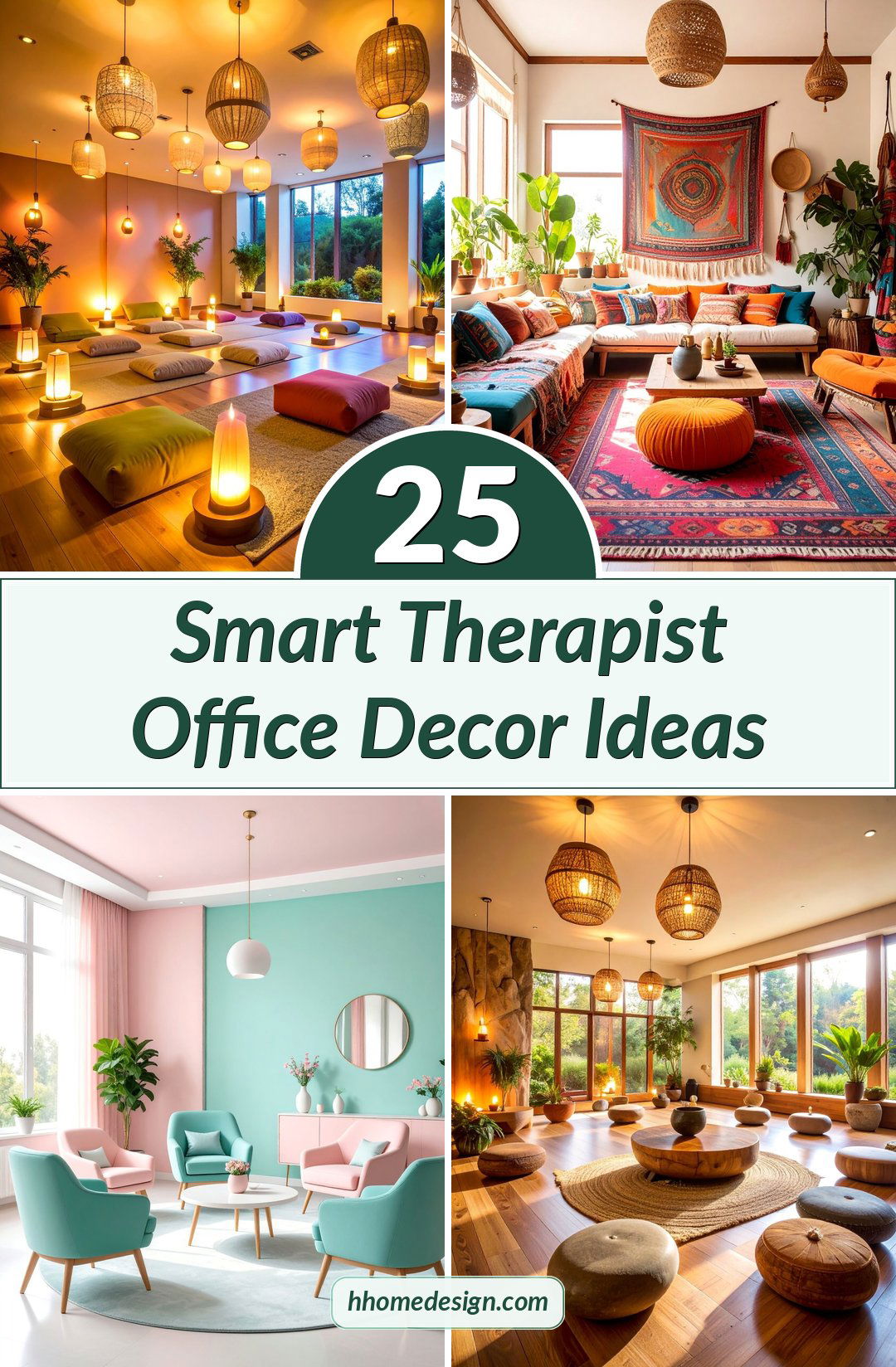
1. Neutral Zen Minimalist Office with Clean Lines
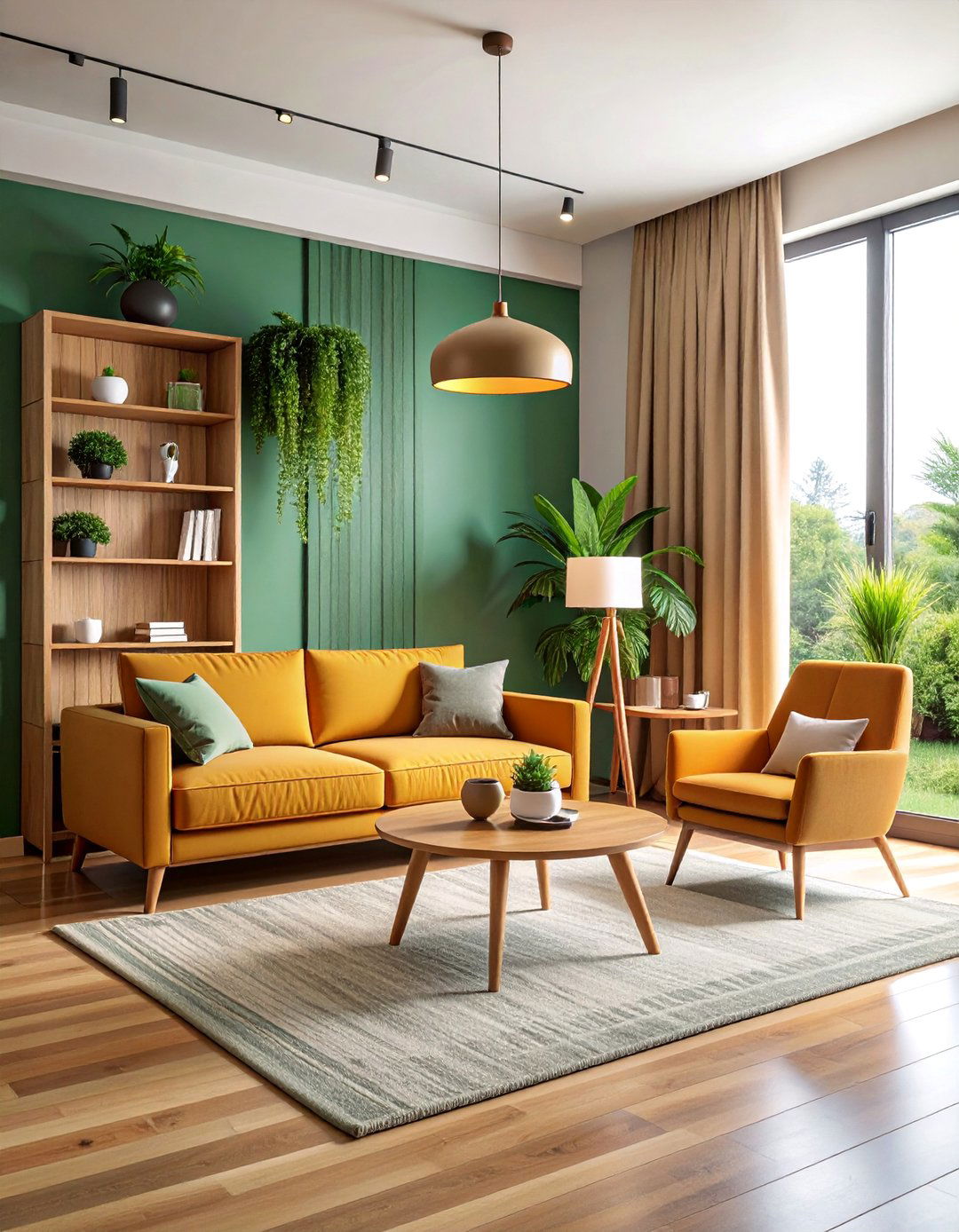
This serene approach embraces simplicity through neutral beiges, soft whites, and light grays that create visual harmony. Clean-lined furniture with minimal ornamentation allows clients to focus inward without distraction. A comfortable beige loveseat faces an ergonomic chair across a simple wooden coffee table, positioned to encourage natural conversation flow. Organized shelving displays a few meaningful items and professional credentials alongside subtle artwork. Soft floor lamps provide warm ambient lighting while natural light filters through sheer curtains. The absence of clutter creates spaciousness, allowing thoughts and emotions to breathe freely within the therapeutic container of this thoughtfully designed space.
2. Biophilic Nature-Inspired Office with Living Elements
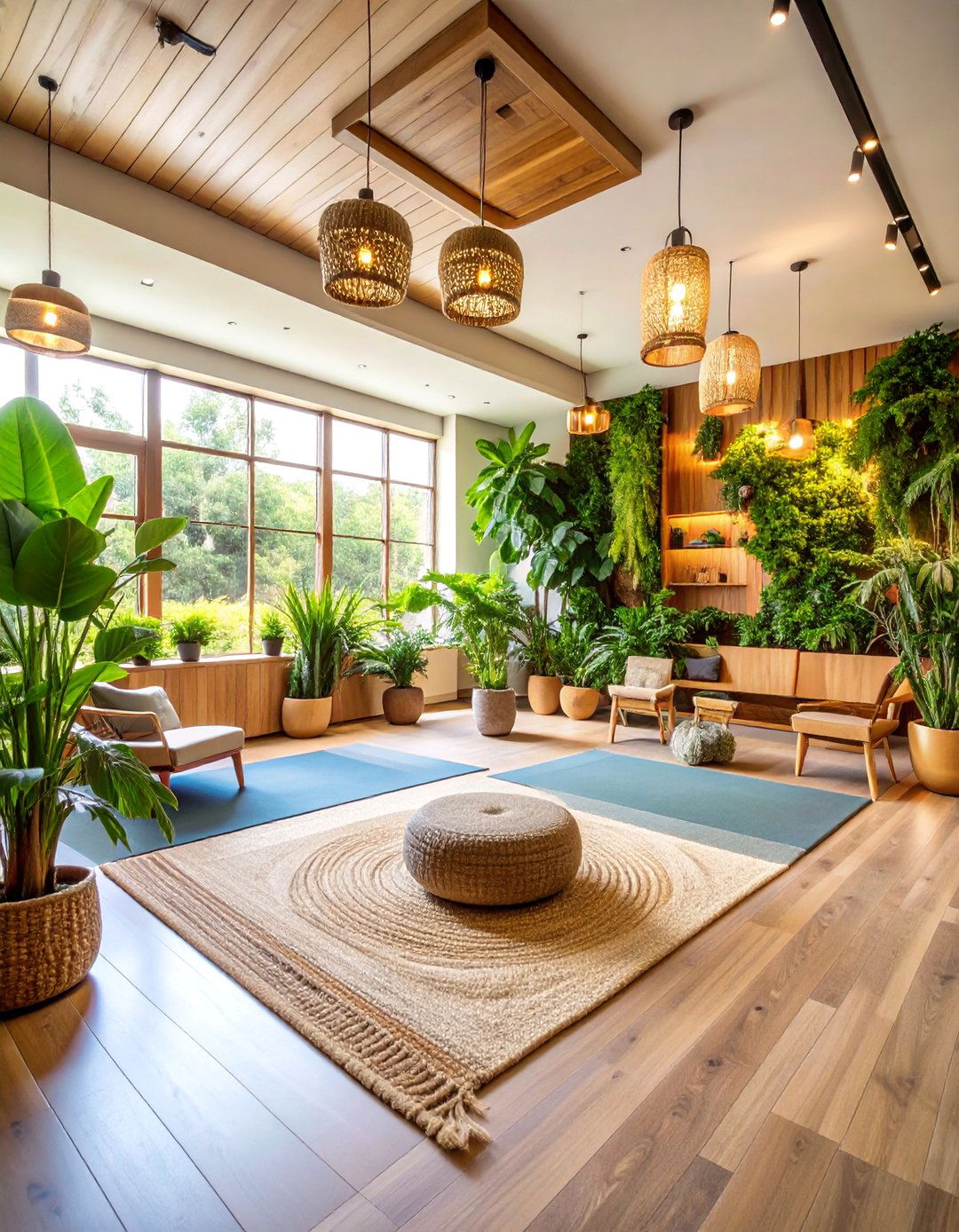
Transform your therapy space into a natural sanctuary featuring abundant plant life, natural materials, and organic textures. Multiple potted plants of varying heights create layers of greenery, from small succulents on side tables to a large fiddle leaf fig in the corner. Natural wood furniture complements stone accents and woven textiles in earthy tones. A small water feature provides gentle ambient sound while natural fiber rugs define seating areas. Large windows maximize natural light, with views of outdoor greenery when possible. This design directly connects clients with nature's healing properties, reducing stress hormones while promoting feelings of growth, renewal, and hope during therapeutic work.
3. Warm Bohemian Therapy Space with Layered Textiles

Create an inviting bohemian atmosphere using rich textiles, warm colors, and eclectic furnishings that feel both professional and welcoming. Deep jewel tones like burgundy and forest green appear in throw pillows and artwork, balanced by neutral furniture. Layered rugs define different areas while macramé wall hangings add texture without overwhelming the space. A comfortable sectional provides flexible seating options alongside a classic therapist chair. Moroccan-inspired lanterns cast warm, diffused light while potted plants in woven baskets bring natural elements. This design appeals to clients who find comfort in richness and variety, creating a cocoon-like environment that encourages emotional exploration and authentic self-expression.
4. Cozy Reading Nook Office with Built-in Comfort
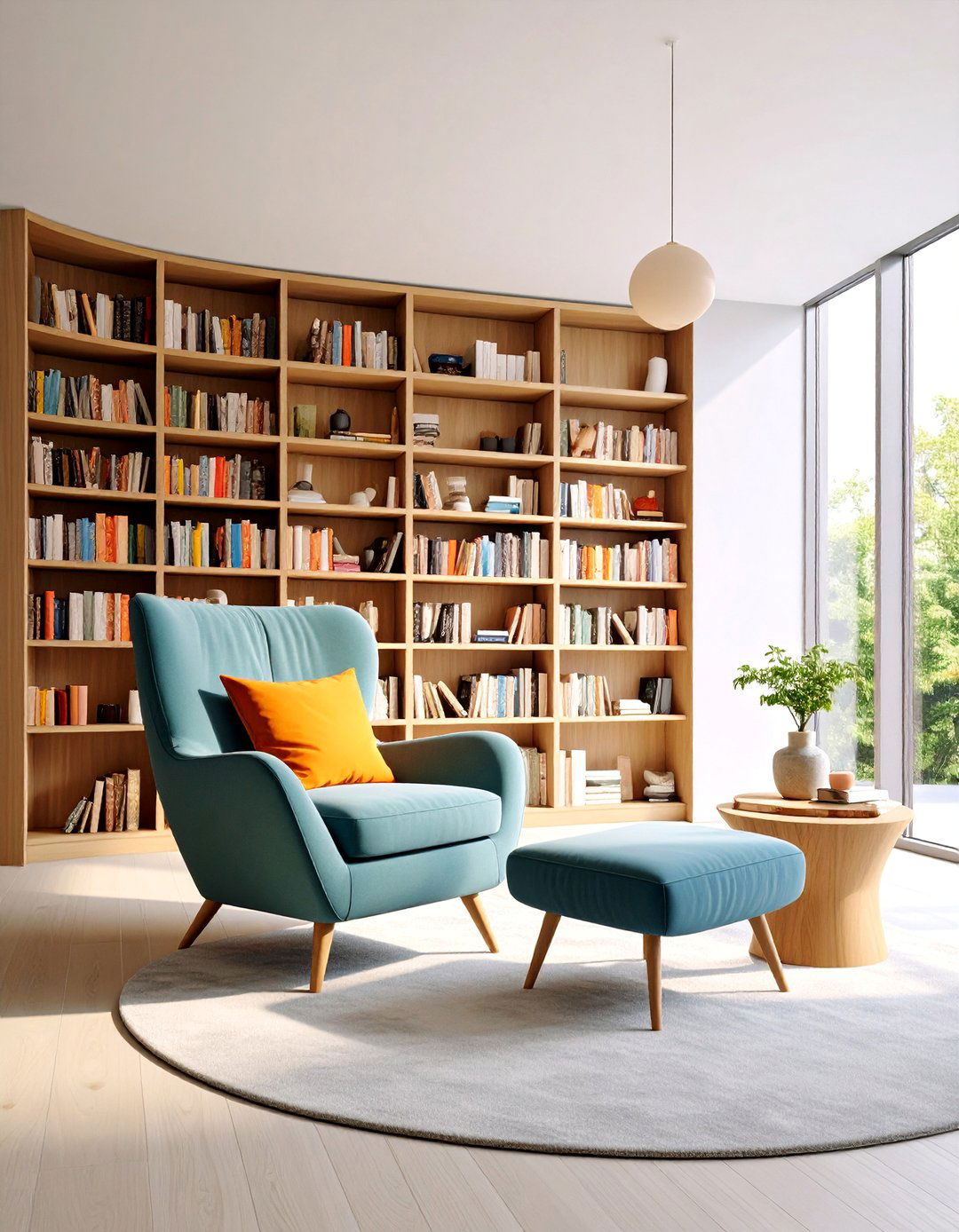
Design a literary sanctuary featuring comfortable reading chairs, built-in bookshelves, and soft lighting that creates an atmosphere of intellectual curiosity and emotional safety. A plush armchair with ottoman faces a therapist's chair near floor-to-ceiling bookshelves filled with carefully selected titles and personal touches. Warm table lamps with fabric shades provide intimate lighting while a soft throw blanket drapes invitingly over the client chair. Rich wood tones in furniture and shelving create warmth, complemented by deep blue and forest green accents. A small side table holds tissues and water, while the overall design suggests wisdom, learning, and the transformative power of stories in healing work.
5. Modern Spa-Like Sanctuary with Wellness Elements
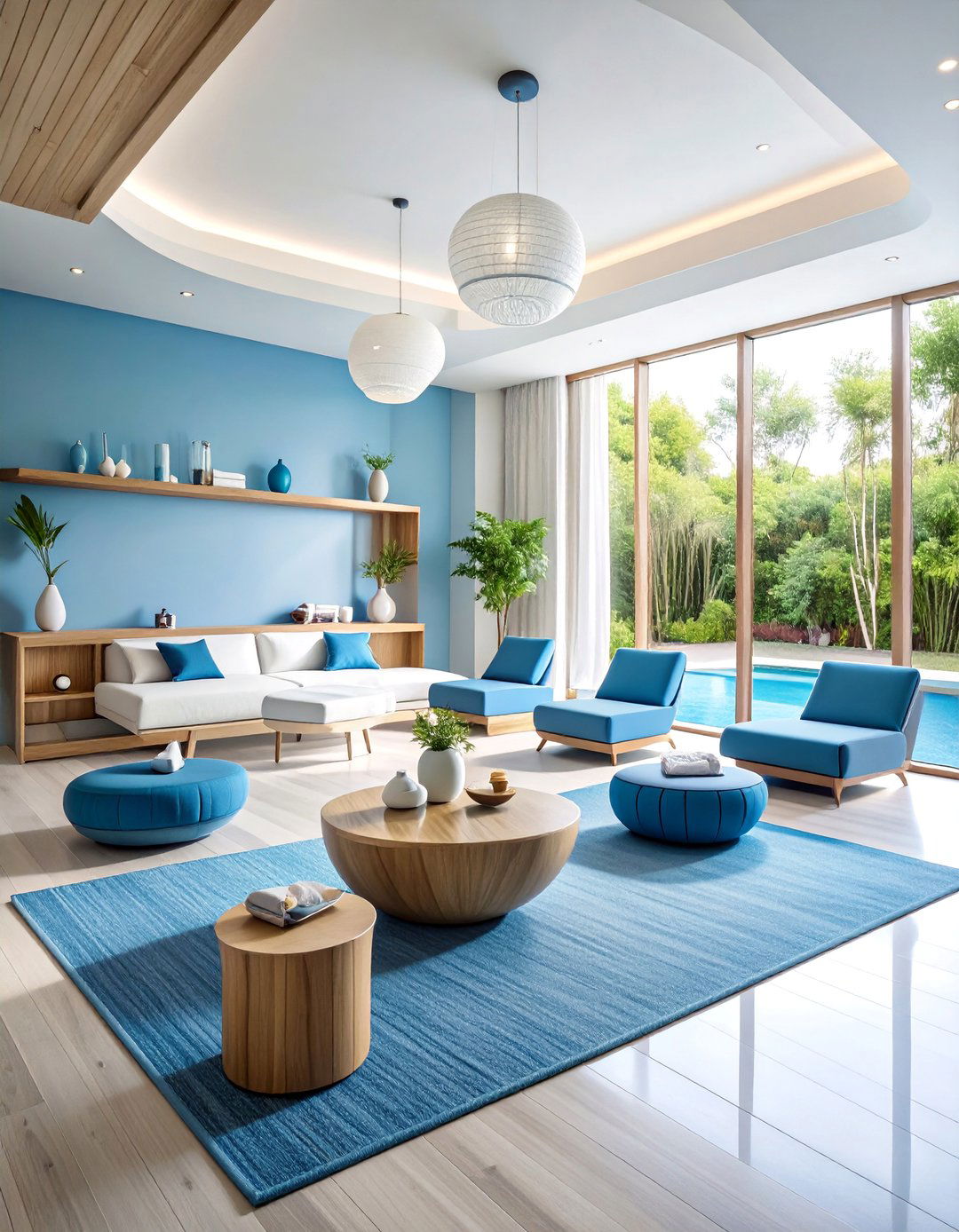
Incorporate spa-inspired elements to create a sophisticated healing environment that promotes relaxation and renewal. Clean lines in contemporary furniture combine with calming colors like soft blues and whites. A sleek water feature provides gentle sound while essential oil diffusers offer subtle aromatherapy benefits. Comfortable massage-style chairs with built-in lumbar support face each other across a glass coffee table. Minimalist artwork featuring abstract nature scenes adorns walls painted in soothing neutral tones. Soft LED lighting systems allow for mood adjustment throughout the day. This design appeals to clients seeking a high-end therapeutic experience while maintaining the professional boundaries essential for effective therapy work.
6. Rustic Cabin Retreat Office with Natural Warmth
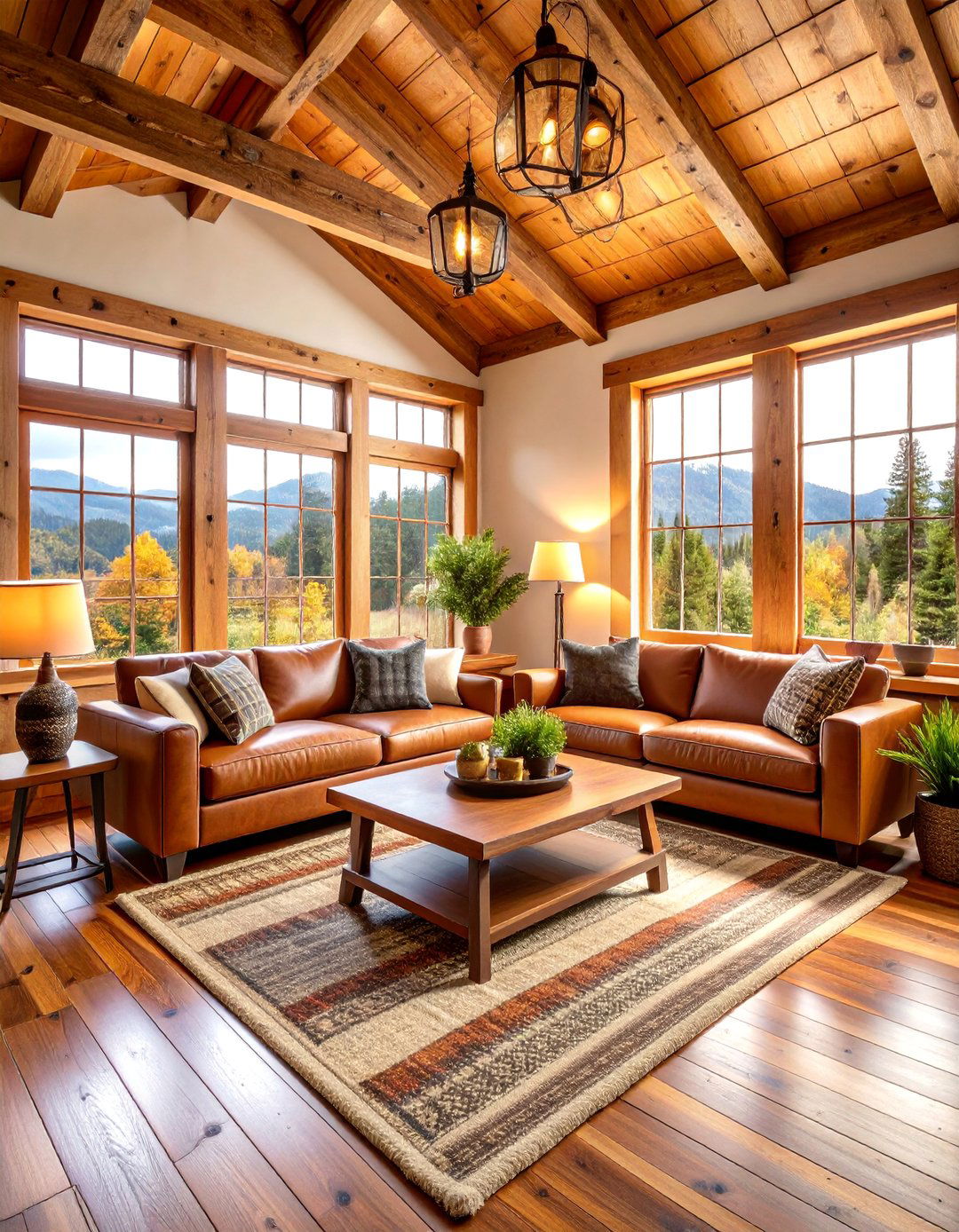
Embrace the comfort of a mountain cabin through natural wood elements, stone accents, and warm earth tones that create a grounding, protective atmosphere. Reclaimed wood furniture includes a comfortable sectional with leather accents facing a wooden therapist chair. A stone accent wall provides texture while warm lighting from wrought-iron fixtures creates ambient glow. Cozy plaid throws and fur pillows add tactile comfort, while potted herbs on windowsills connect to nature. Rich browns, deep reds, and forest greens create a color palette that feels both masculine and nurturing. This design particularly appeals to clients who find healing in nature's stability and strength.
7. Soft Pastels Calming Space with Gentle Energy
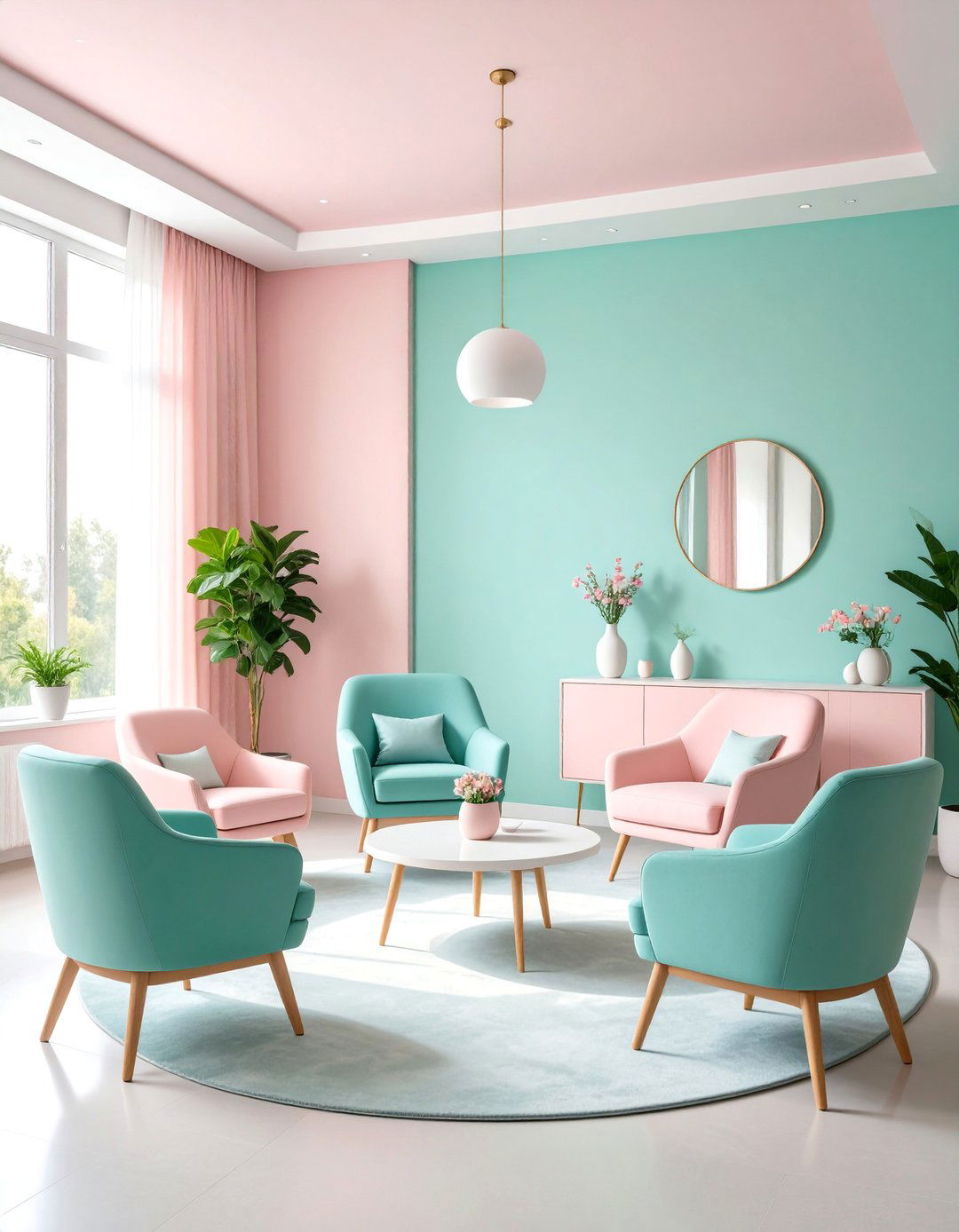
Create a soothing environment using soft pastels that promote emotional regulation and peaceful contemplation. Pale pink, lavender, and mint green appear in artwork, throw pillows, and accent pieces against a backdrop of soft white walls. Comfortable furniture in light fabrics provides seating while maintaining visual lightness. Sheer curtains filter natural light softly while delicate plants in ceramic planters add life without overwhelming the gentle aesthetic. A round coffee table with smooth edges eliminates sharp angles, contributing to the space's overall softness. This design works particularly well for clients dealing with anxiety, trauma, or emotional overwhelm, providing a nurturing environment that feels safe and contained.
8. Garden Therapy Room with Indoor Greenhouse Feel
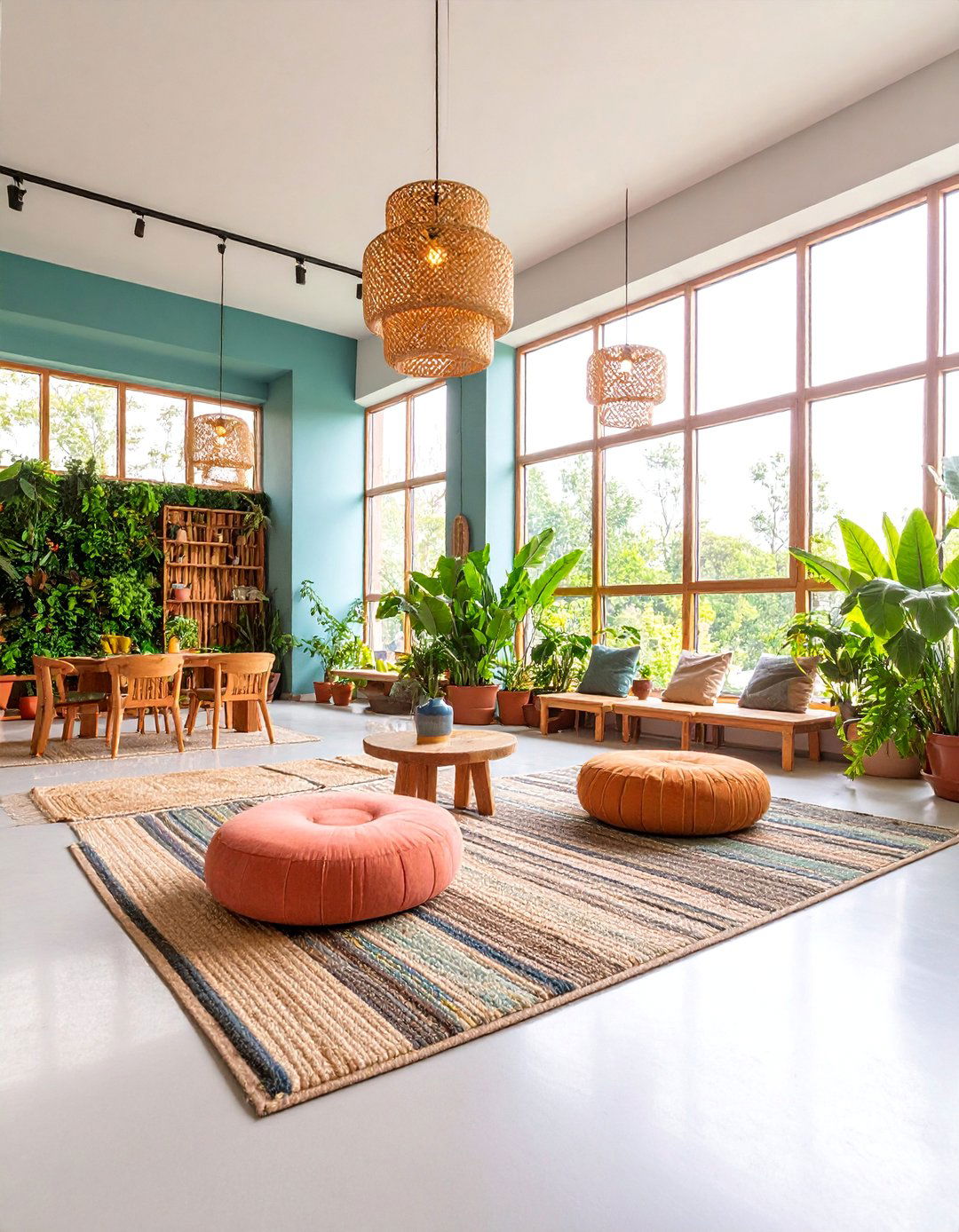
Transform your office into an indoor garden sanctuary featuring multiple plant varieties, natural light, and organic materials that celebrate growth and renewal. Large windows provide ample natural light for thriving plants arranged at various heights throughout the space. Wooden furniture with live-edge details complements terra cotta planters and woven baskets. A green wall or large plant installation creates a focal point while smaller plants occupy side tables and shelves. Natural fiber rugs and linen cushions in earth tones complete the organic aesthetic. This design metaphorically supports therapeutic themes of growth, healing, and positive change while providing the stress-reducing benefits of abundant plant life.
9. Warm Wood Natural Office with Organic Flow
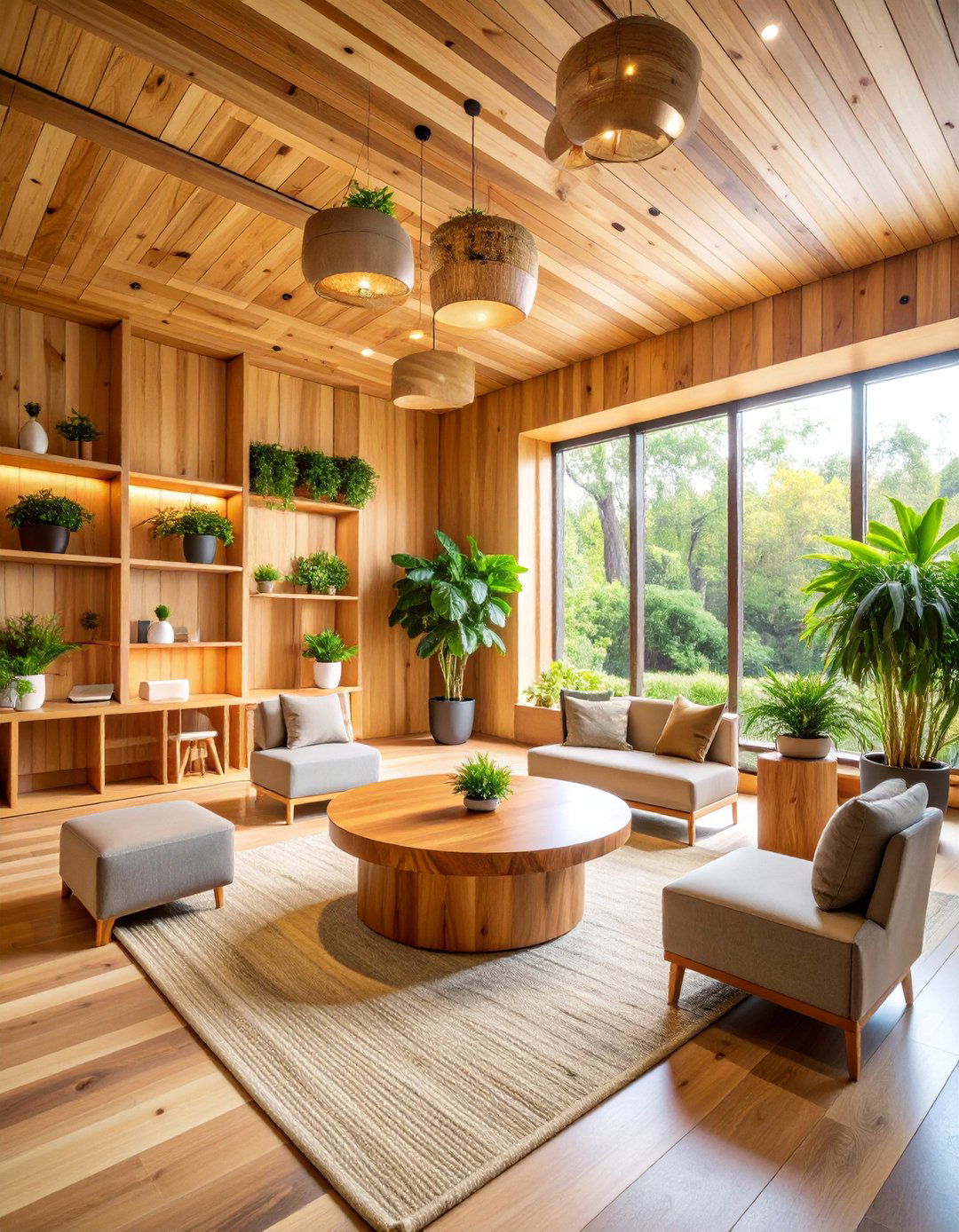
Celebrate natural wood elements through furniture, flooring, and accents that create warmth and grounding energy. Different wood tones work together harmoniously, from light oak furniture to darker walnut accent pieces. Live-edge coffee tables and natural wood shelving display books and meaningful objects. Neutral cushions in natural fabrics complement the wood tones while adding comfort. Warm lighting highlights the wood's natural grain patterns, creating visual interest and connection to nature. Plants in wooden planters enhance the organic theme while maintaining professional boundaries. This design appeals to clients seeking stability and authenticity, providing a solid foundation for therapeutic work while celebrating natural beauty.
10. Blue Ocean Serenity Theme with Calming Waters
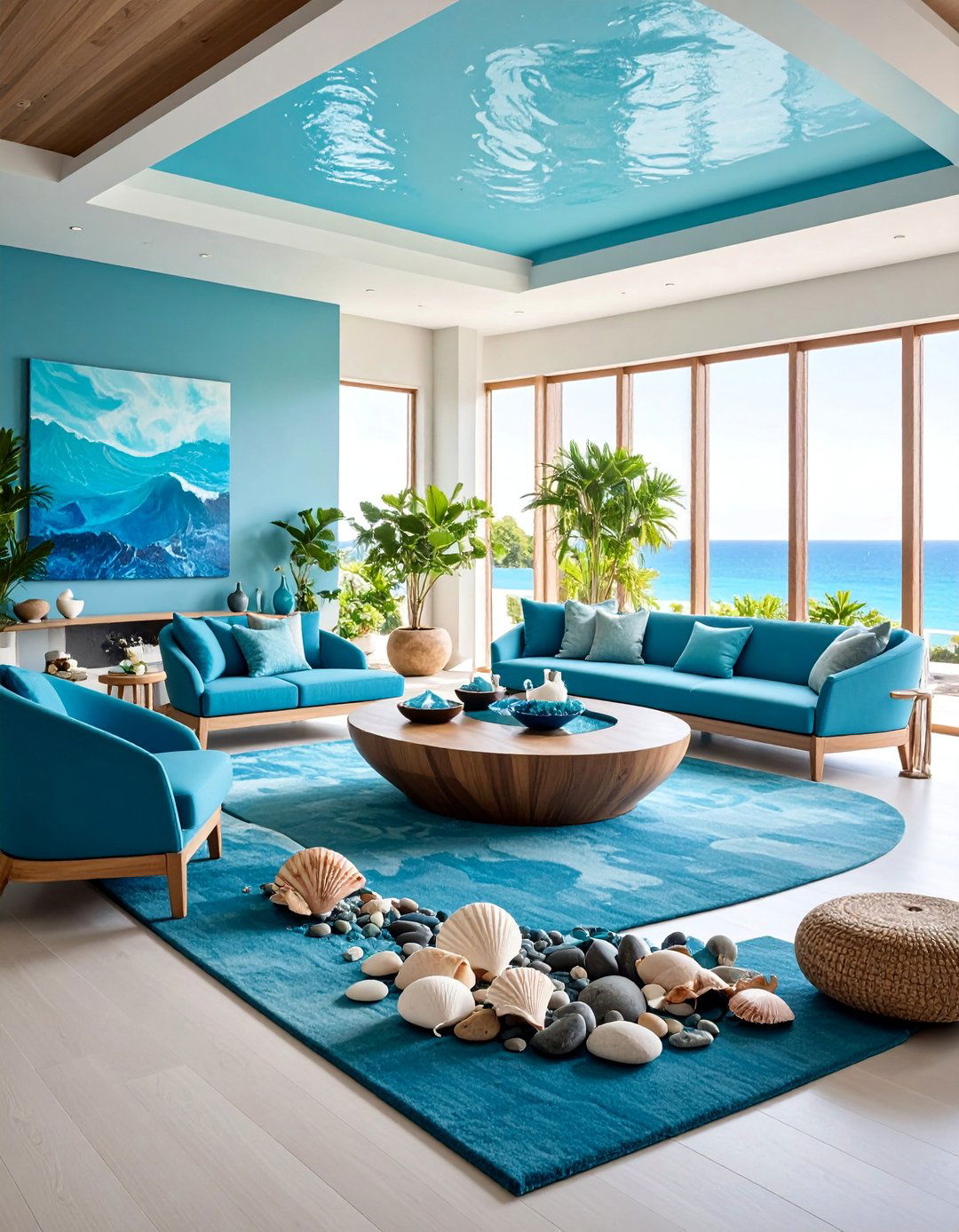
Embrace the calming power of water through various shades of blue, flowing lines, and water-inspired decorative elements. Soft blues from powder to navy create depth while white and sand-colored accents maintain balance. Comfortable furniture in ocean-inspired fabrics faces toward artwork featuring abstract water scenes or coastal landscapes. A small tabletop fountain provides gentle water sounds while smooth stones and shells offer tactile elements. Curved furniture lines echo water's natural flow, avoiding sharp angles that might create tension. Soft lighting mimics natural light reflecting off water, creating a peaceful atmosphere that promotes emotional flow and stress reduction throughout therapeutic sessions.
11. Earthy Grounding Space with Natural Materials
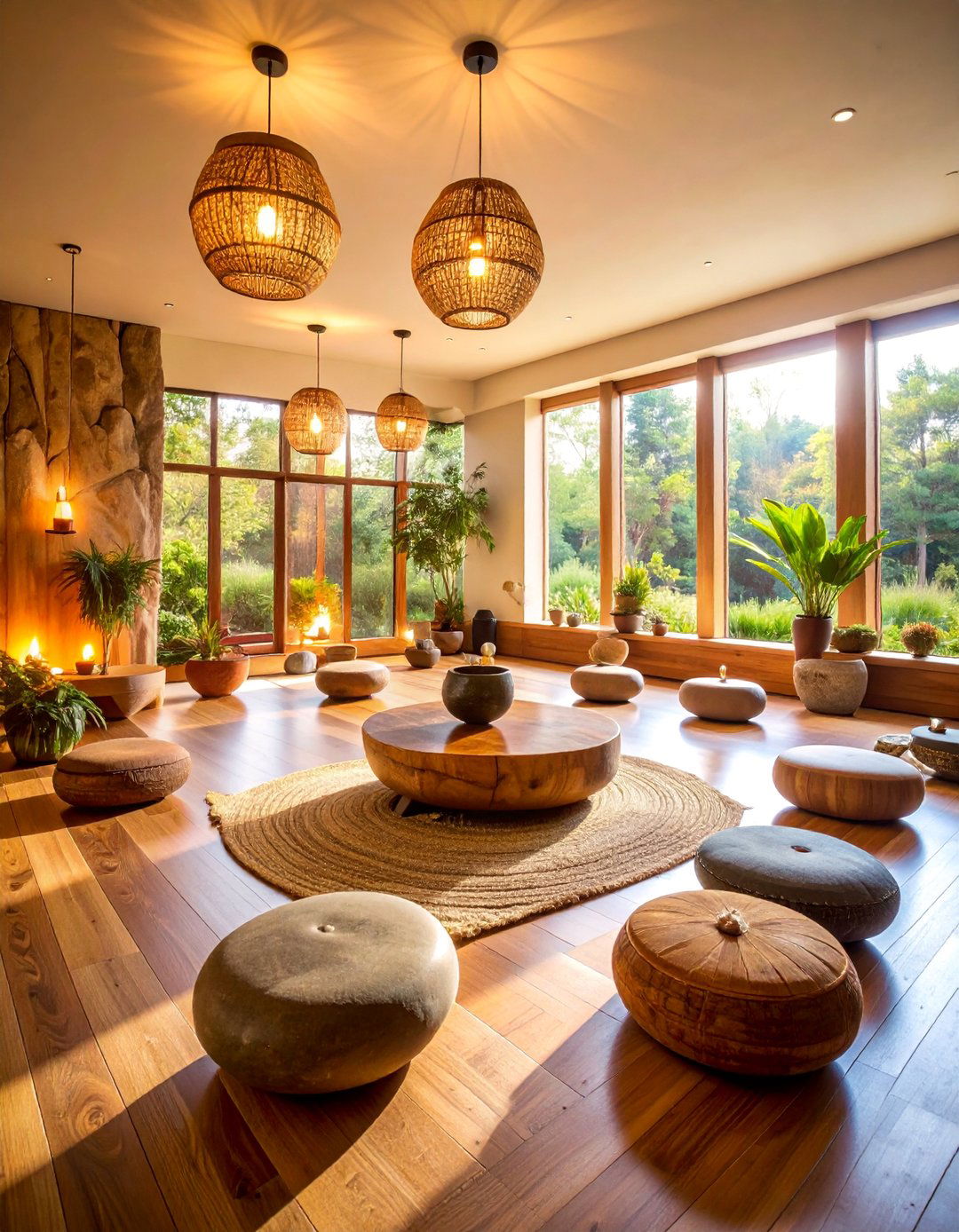
Create a deeply grounding environment using earth-toned colors, natural stone, and organic textures that promote stability and connection. Rich browns, warm ochres, and deep oranges appear in furniture and accent pieces while stone elements add weight and permanence. A large area rug in natural fibers defines the seating area, anchored by substantial wooden furniture with clean lines. Potted plants in ceramic containers provide life and growth symbolism while natural light streams through wooden blinds. This design particularly supports clients working through major life transitions or seeking greater stability, providing a therapeutic container that feels both nurturing and strong.
12. Light and Airy Scandinavian with Hygge Elements
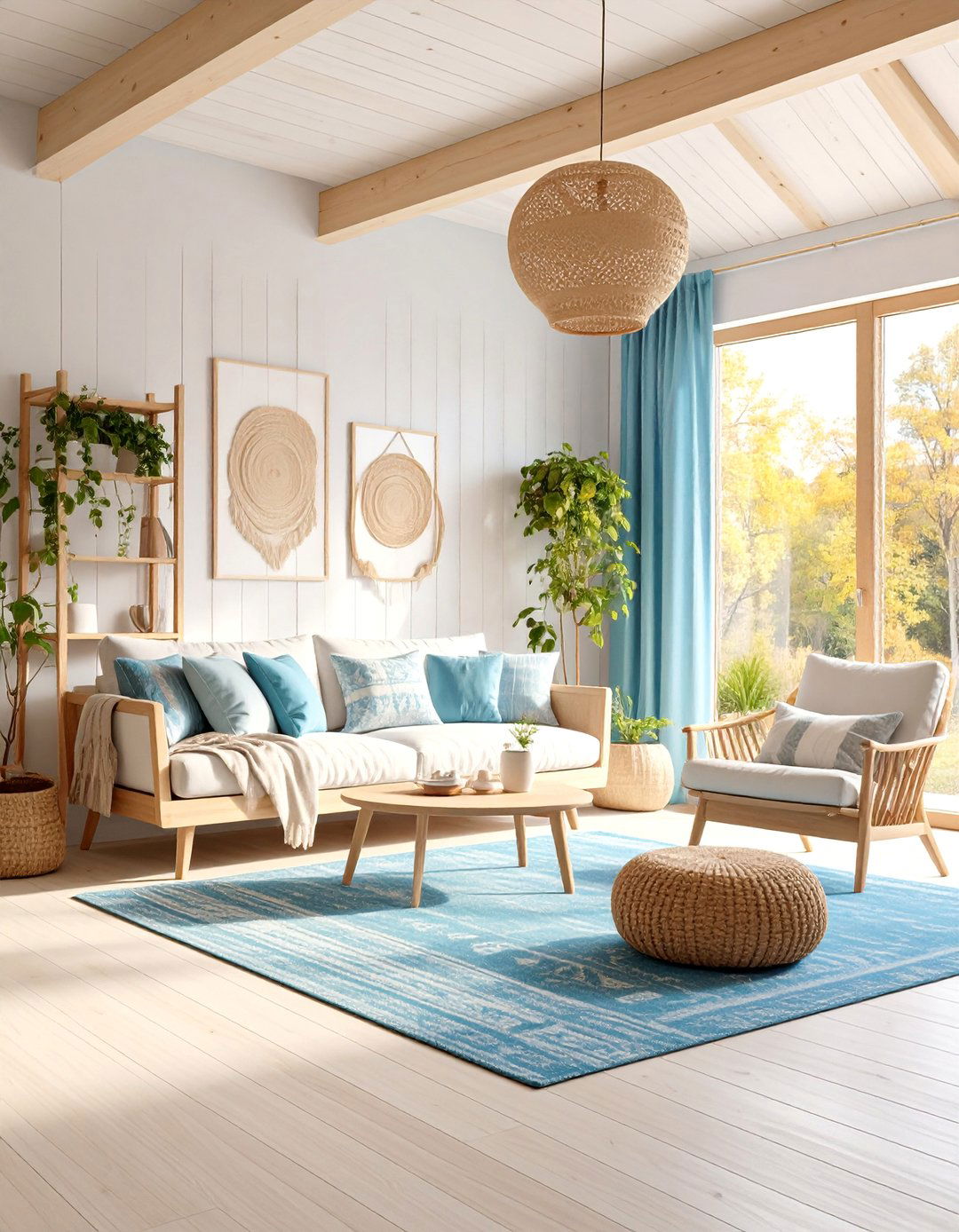
Incorporate Scandinavian design principles emphasizing light, simplicity, and cozy comfort through clean lines and functional beauty. White and light wood dominate the color palette, creating spaciousness and calm. Simple, well-designed furniture includes a comfortable loveseat with soft throw blankets and cushions in muted colors. Minimalist artwork and a few carefully chosen objects provide visual interest without clutter. Natural light floods the space through unadorned windows while simple pendant lighting provides evening ambiance. This design appeals to clients who find peace in simplicity and order, creating a clean slate for therapeutic exploration while maintaining warmth through thoughtful comfort elements.
13. Sage Green Healing Room with Restorative Energy
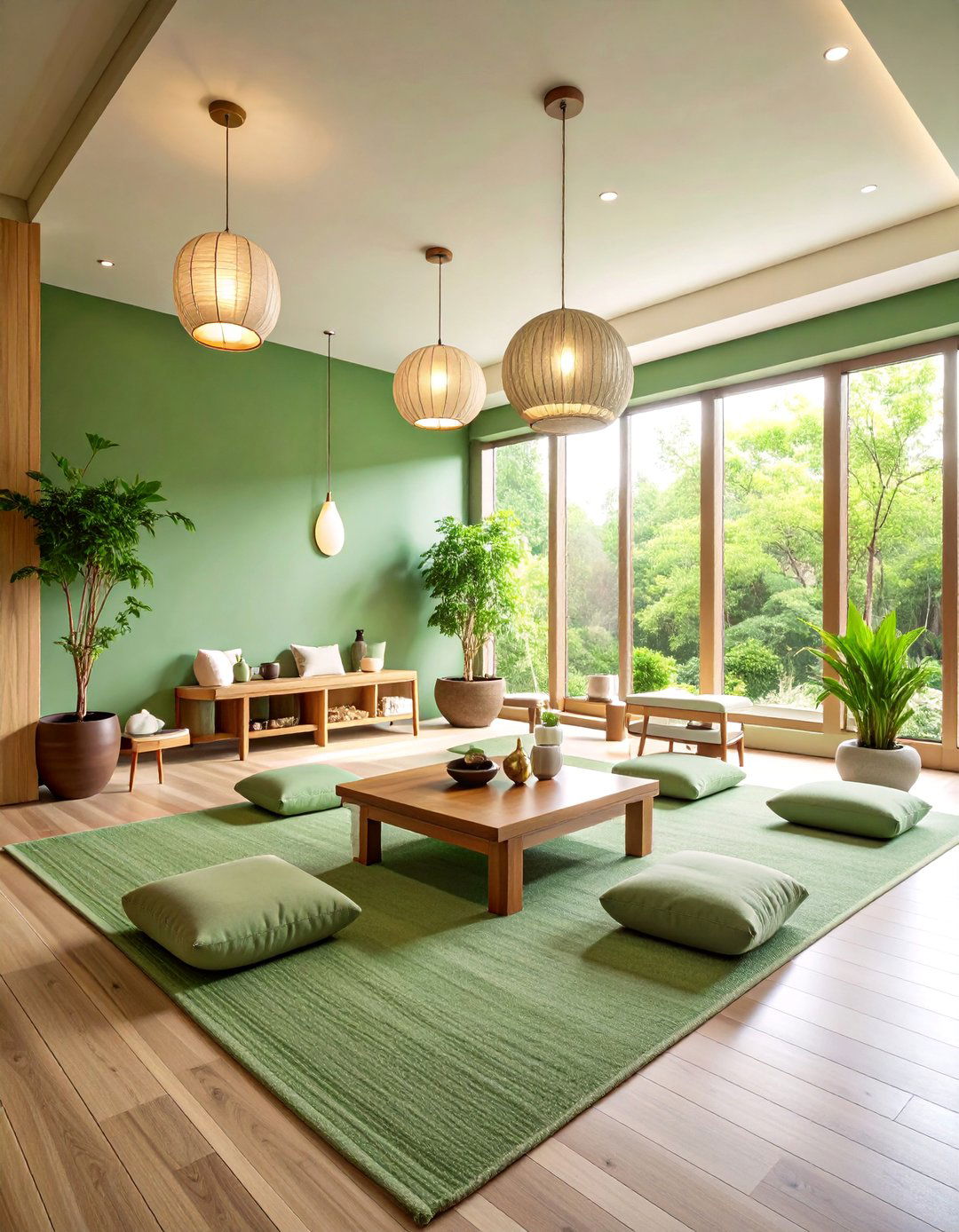
Center the space around calming sage green, a color scientifically proven to reduce anxiety and promote healing. Sage green walls provide a sophisticated backdrop for neutral furniture in creams and soft browns. Plants with silvery-green foliage complement the color scheme while natural wood elements add warmth. Comfortable seating includes a sage green accent chair facing a neutral loveseat, with soft lighting from brass fixtures creating a warm glow. Natural fiber rugs and linen curtains enhance the organic feel while maintaining professional aesthetics. This design creates an environment that feels inherently healing, supporting clients in feeling safe enough to explore difficult emotions and experiences.
14. Textured Comfort Zone with Tactile Elements
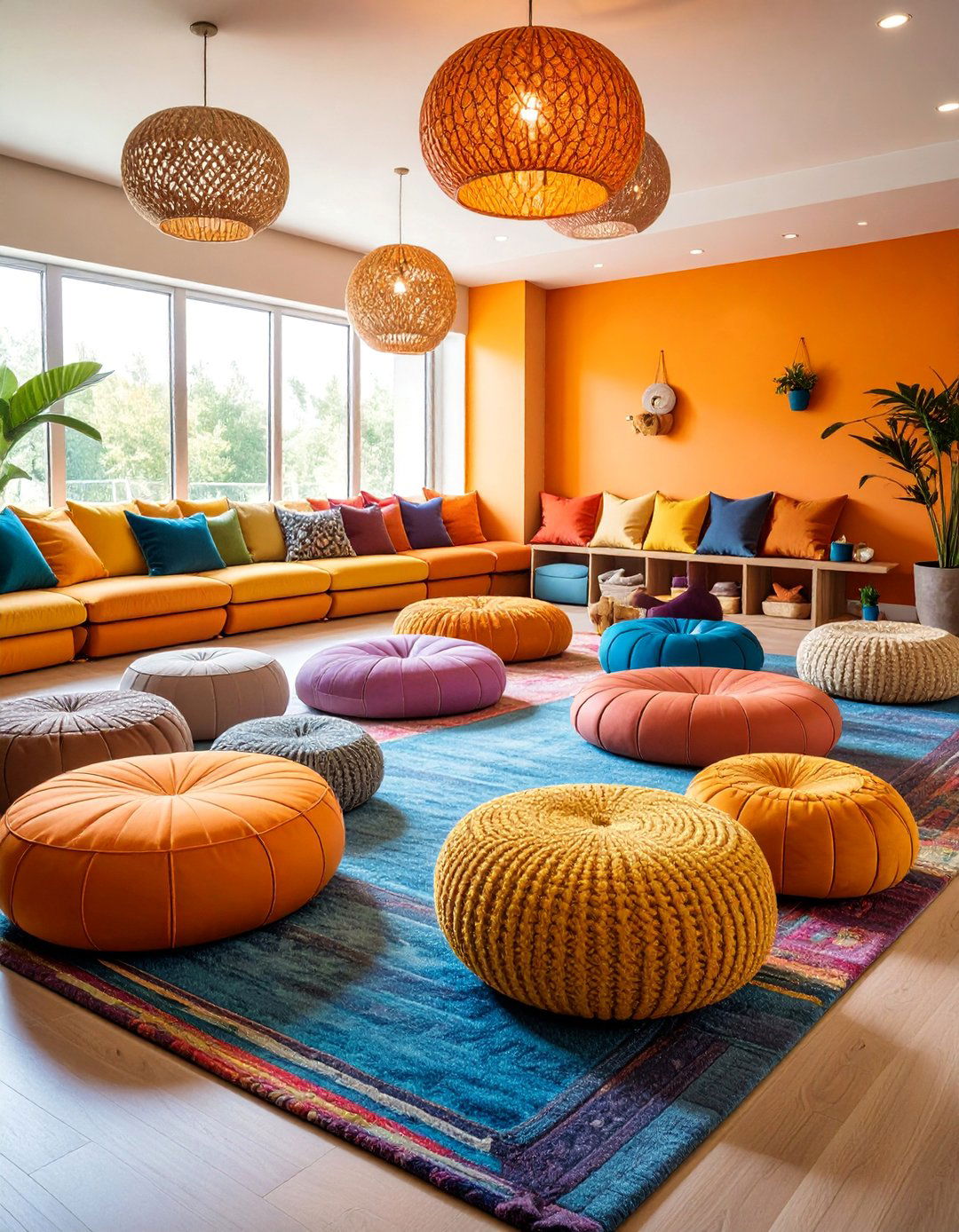
Emphasize comfort through varied textures that provide sensory richness and emotional comfort. Multiple fabric textures include velvet cushions, woven throws, and smooth leather seating arranged to invite touch and comfort. A variety of rugs layer over hardwood floors while textured wall treatments add visual interest. Baskets hold soft blankets clients can use during sessions, while tactile objects on side tables provide grounding tools. Warm lighting enhances texture visibility while maintaining softness. This design particularly benefits clients who process emotions through sensory experience, providing multiple tactile comfort options while maintaining appropriate therapeutic boundaries and professional presentation.
15. Artistic Expression Office with Creative Inspiration
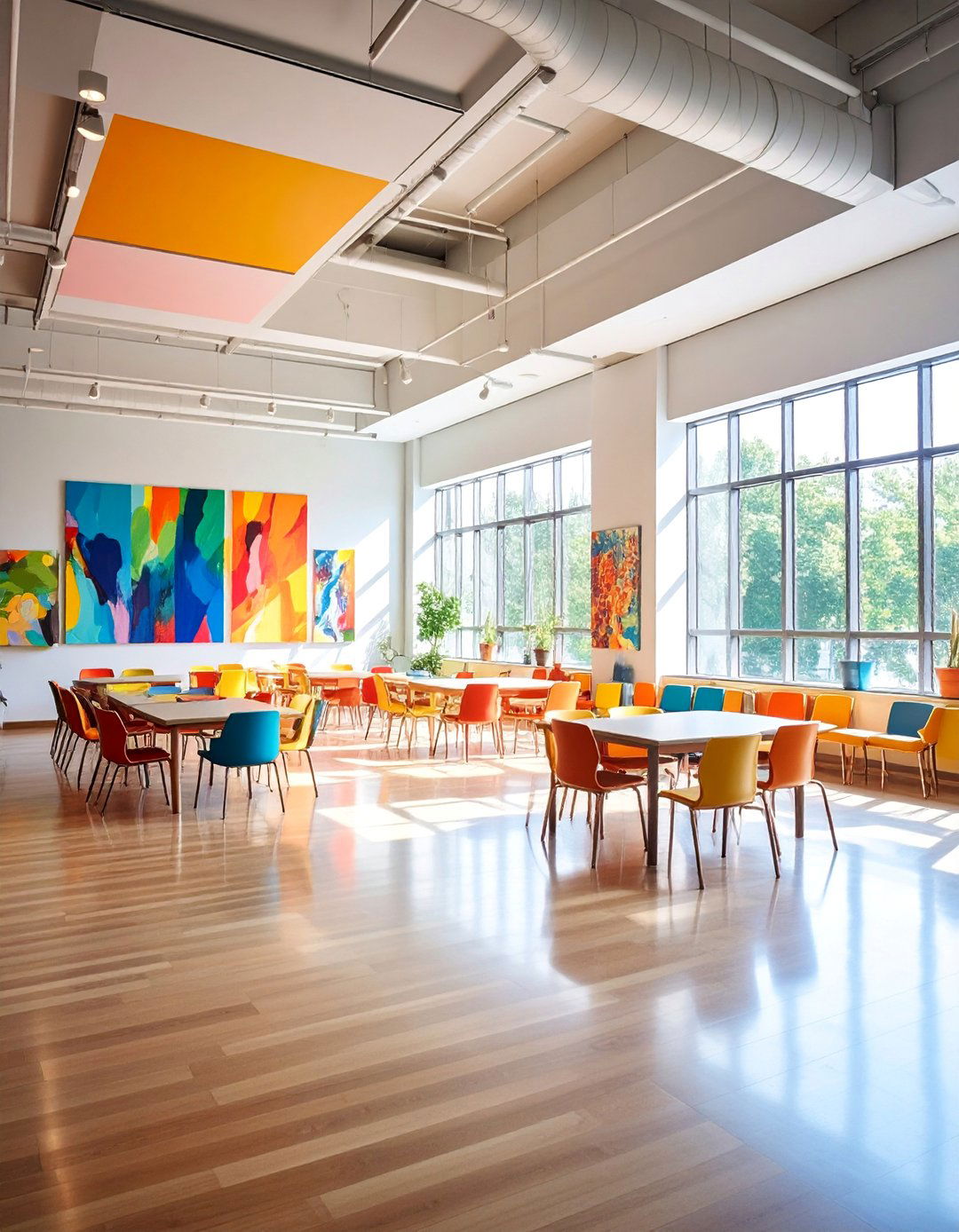
Showcase local artwork and creative elements that inspire self-expression while maintaining therapeutic focus. Gallery walls feature rotating displays of meaningful artwork alongside professional credentials. A dedicated area includes art supplies for expressive therapy activities, with comfortable seating positioned to encourage both conversation and creative work. Good lighting illuminates artwork while natural light supports creative activities. Color palette draws from featured artwork while maintaining therapeutic calm through neutral base colors. Storage solutions keep art supplies organized but accessible. This design appeals to creative clients while supporting therapeutic modalities that incorporate artistic expression, providing inspiration without distraction from the primary therapeutic relationship.
16. Meditation-Inspired Space with Mindful Elements
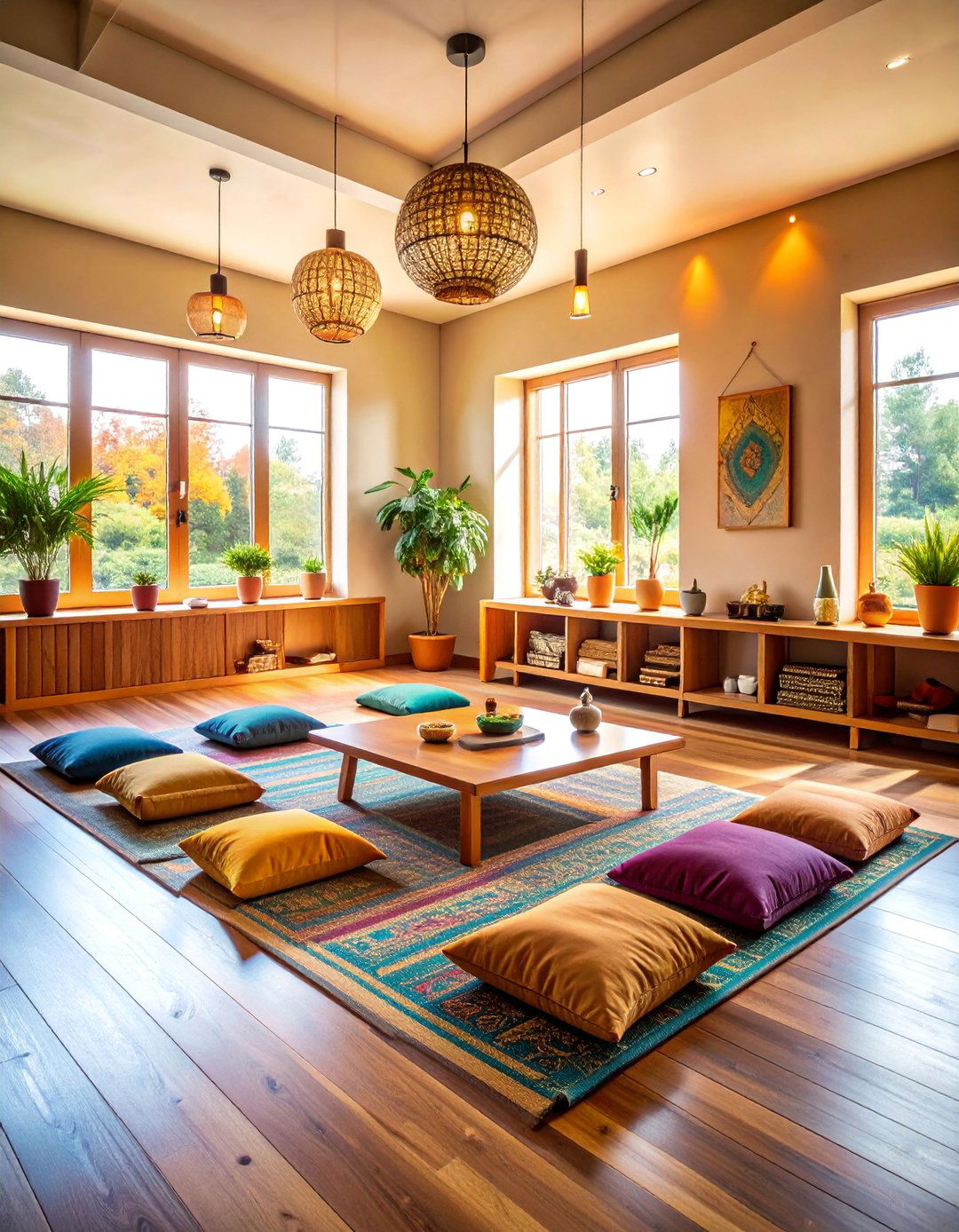
Create a space supporting mindfulness practices through intentional design, calm colors, and meditation-friendly features. Neutral colors with warm undertones provide a peaceful backdrop for simple, comfortable furniture arranged to support both conversation and mindful practices. A dedicated corner includes meditation cushions and a small altar or focal point with meaningful objects. Soft lighting can be dimmed for meditation practices while maintaining adequate illumination for traditional therapy work. Natural elements like plants and smooth stones provide grounding focal points. This design supports therapists incorporating mindfulness-based interventions while creating an atmosphere that naturally encourages present-moment awareness and inner reflection.
17. Warm Lighting Sanctuary with Ambiance Control
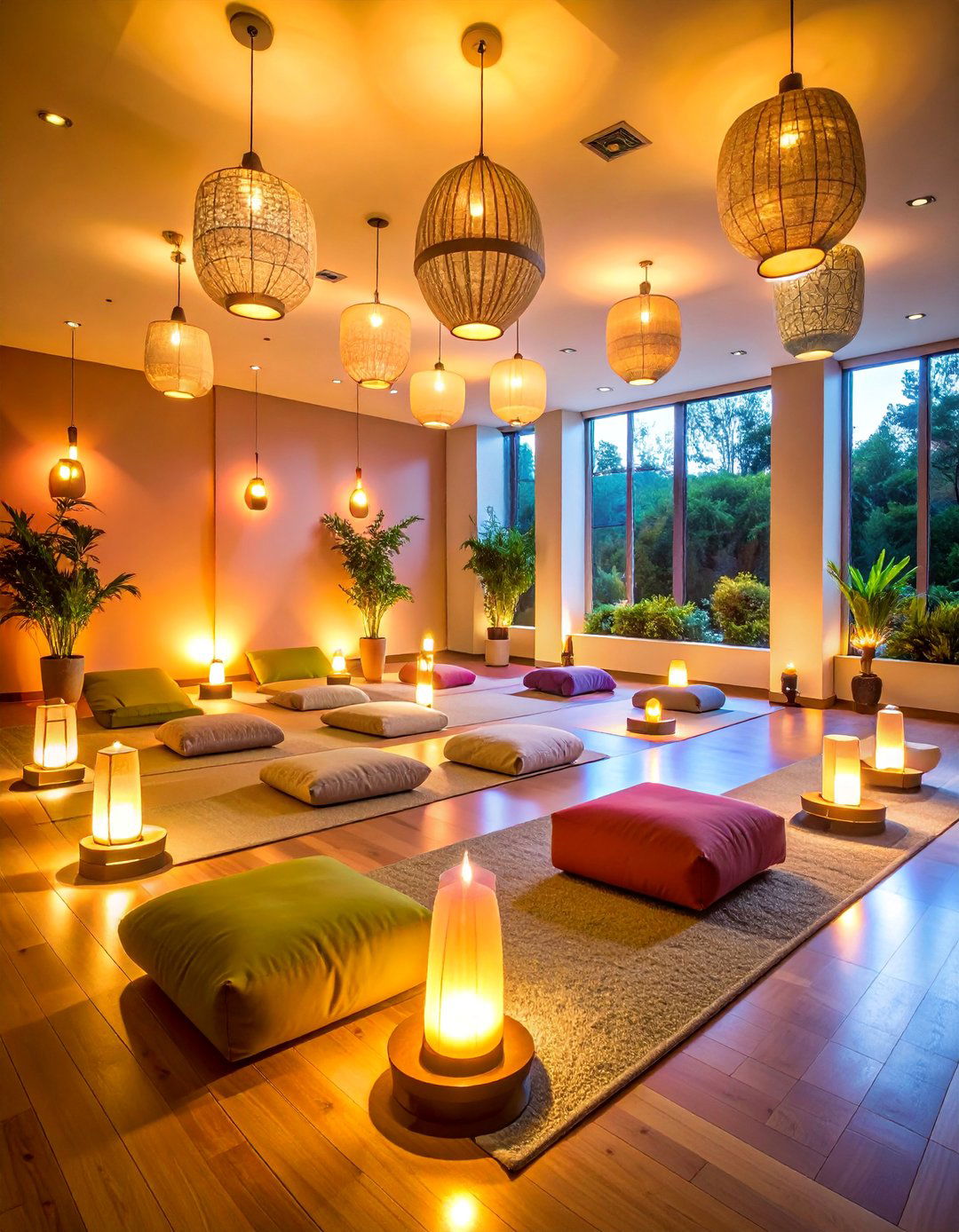
Focus on creating the perfect lighting environment through layered illumination that can be adjusted throughout the day and across seasons. Multiple light sources include table lamps, floor lamps, and overhead fixtures with dimmer controls. Warm-toned bulbs create inviting ambiance while natural light is maximized through strategic window treatments. Lighting highlights artwork and plants while avoiding harsh shadows or glare. Comfortable furniture is positioned to take advantage of optimal lighting conditions. This design recognizes lighting's crucial role in therapeutic work, providing flexibility to create the most supportive atmosphere for different clients and therapeutic approaches while maintaining professional standards.
18. Natural Stone Elements Office with Grounding Energy
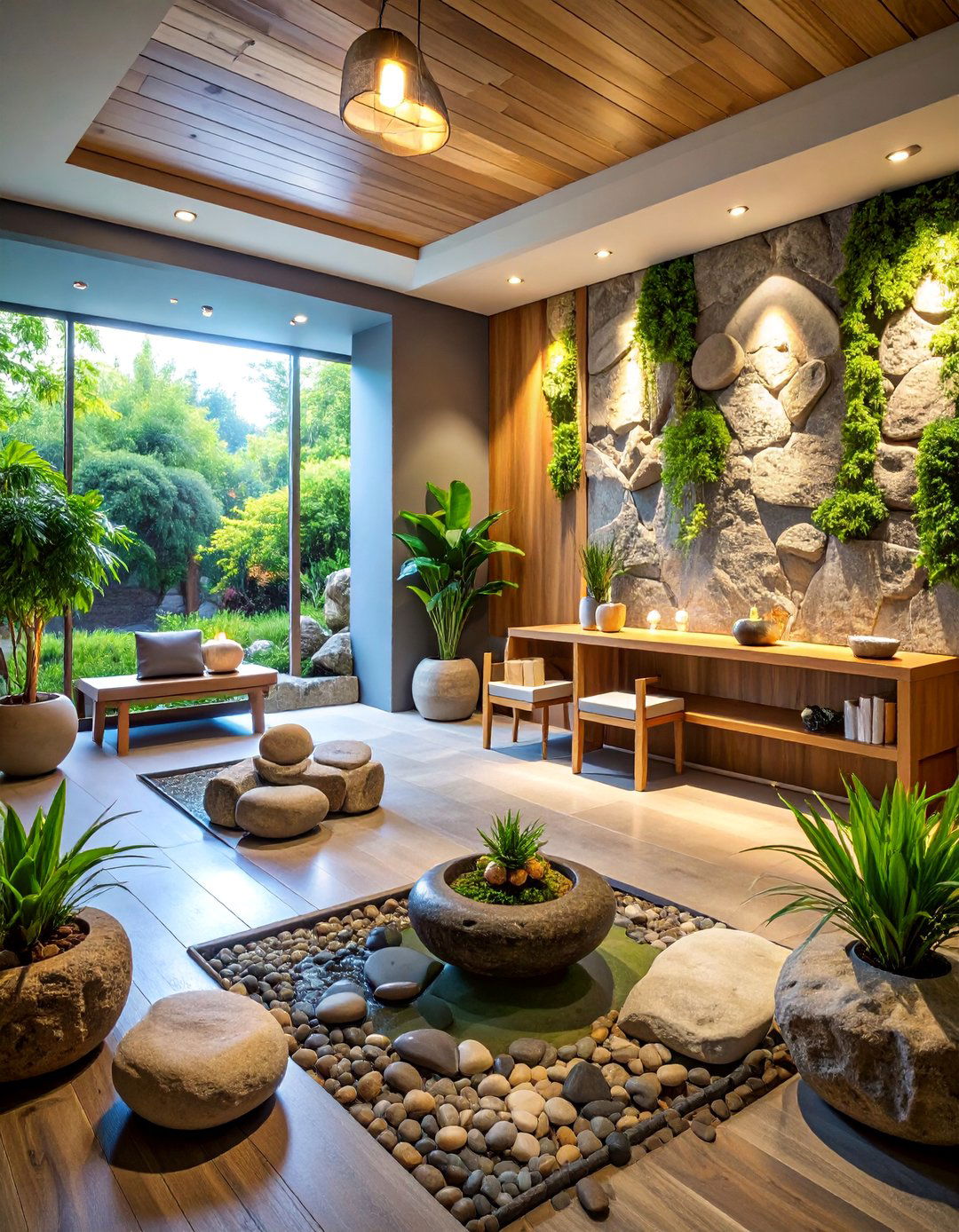
Incorporate various stone elements that provide visual weight, texture, and connection to earth's stability. A stone accent wall creates a dramatic but calming focal point while smaller stone elements appear in decorative objects and plant containers. Natural stone tiles or elements contrast beautifully with warm wood furniture and soft textiles. Water feature incorporating stone provides gentle sound while stone sculptures or objects offer tactile grounding tools. Lighting emphasizes stone's natural beauty while plants soften harder edges. This design appeals to clients needing grounding and stability, providing a therapeutic environment that feels both substantial and nurturing while maintaining professional aesthetics.
19. Layered Textiles Bohemian with Global Influences
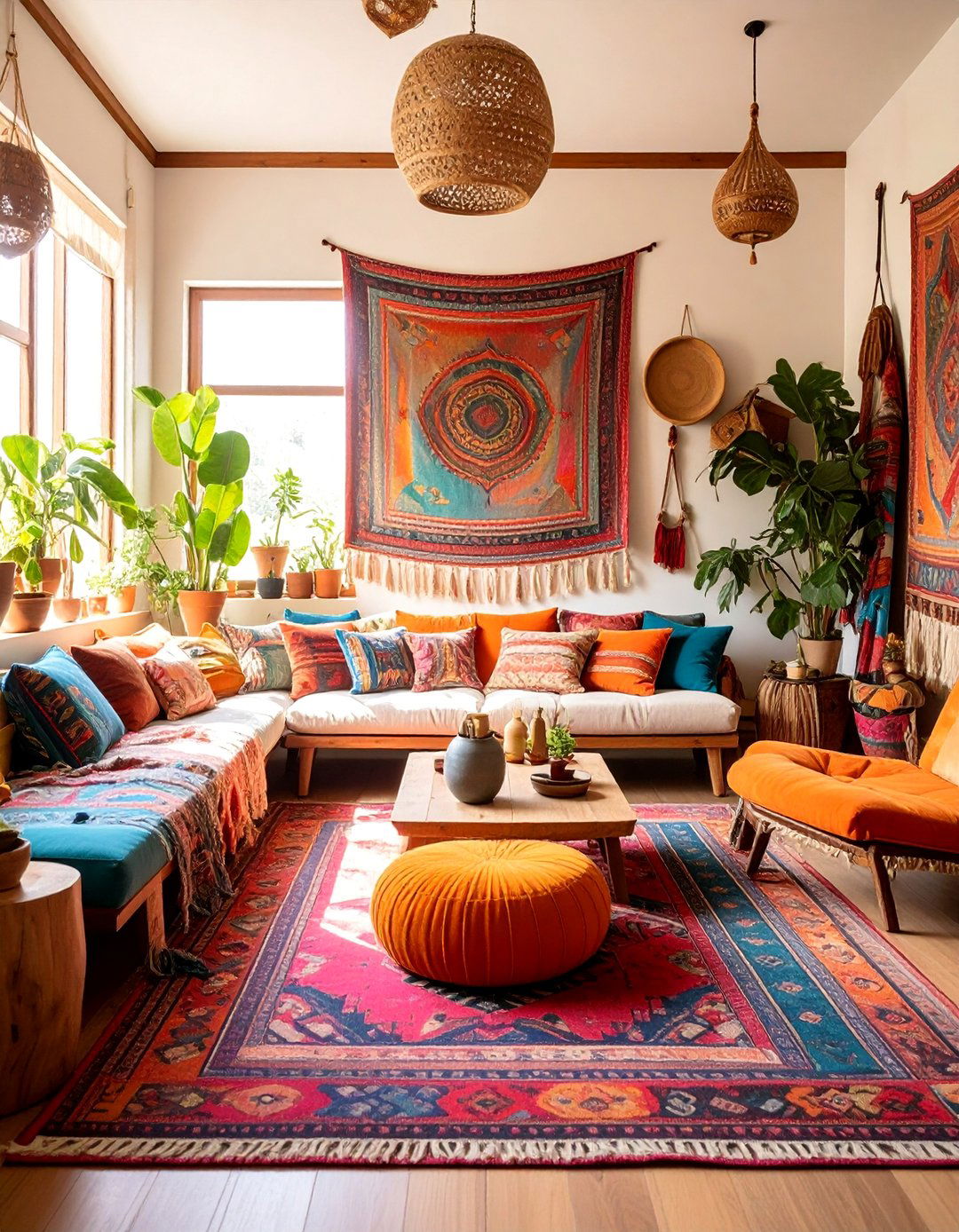
Create rich visual interest through carefully layered textiles from various cultures, maintaining therapeutic calm through color coordination. Multiple rugs, throws, and cushions create comfort and visual warmth while artwork from different traditions adds meaning without overwhelming the space. Comfortable seating includes options for different cultural sitting preferences while maintaining therapeutic positioning. Natural elements and plants provide freshness against rich textile backgrounds. Warm lighting highlights textile details while maintaining overall ambiance. This design appeals to clients from diverse backgrounds while creating an atmosphere that celebrates human creativity and connection, supporting therapeutic work that honors cultural identity and personal history.
20. Window-Focused Nature Office with Outdoor Connection
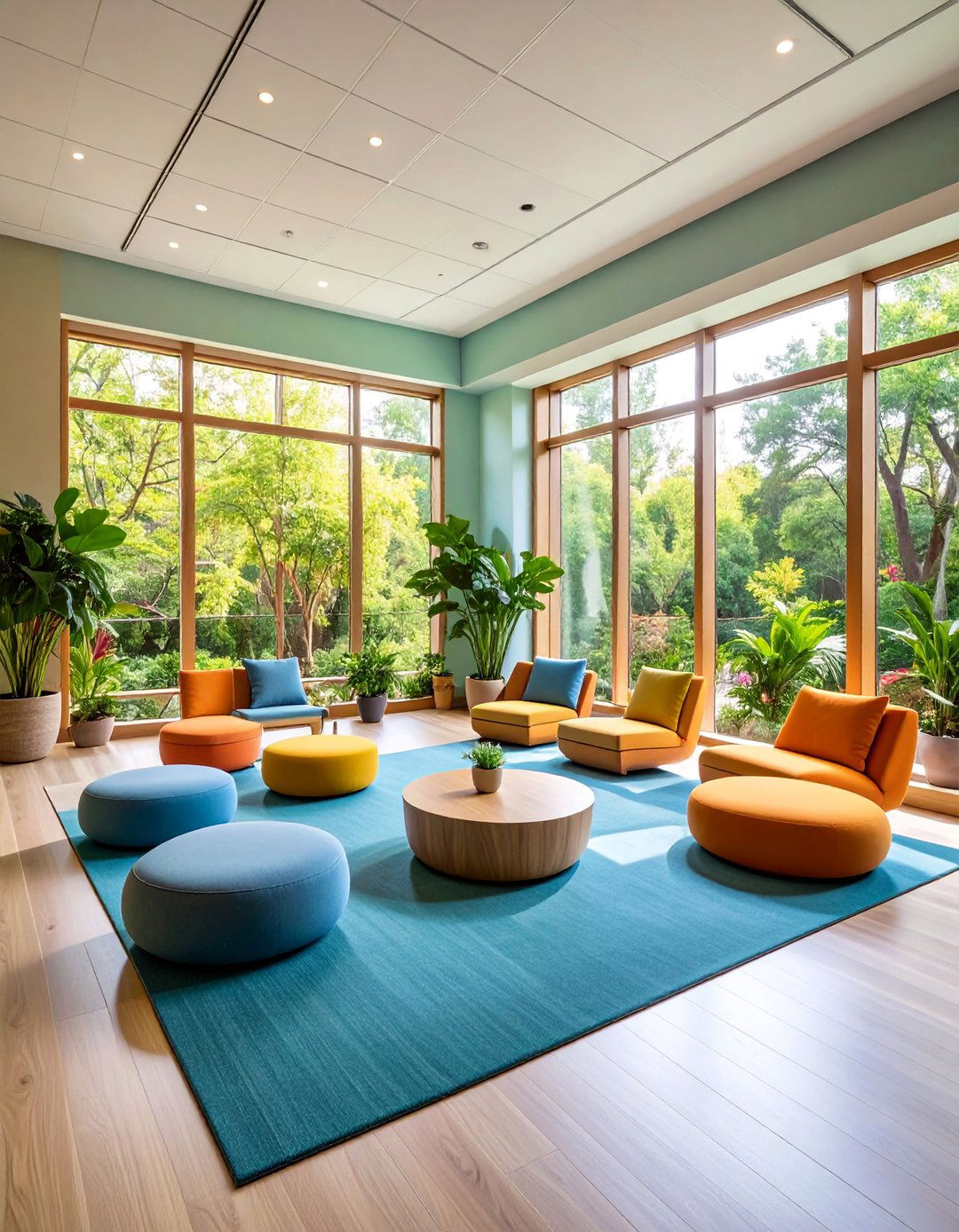
Maximize natural elements by positioning the therapeutic space to take full advantage of window views and natural light. Seating arrangement prioritizes views of trees, gardens, or natural elements while maintaining therapeutic positioning. Window treatments allow light control without blocking views when possible. Indoor plants complement outdoor greenery visible through windows. Natural materials in furniture and decor echo outdoor elements while comfortable seating ensures clients can enjoy views without distraction. This design works particularly well for offices with good natural views, creating seamless connection between indoor therapeutic space and outdoor healing elements while maintaining professional boundaries.
21. Essential Oils Aromatherapy Room with Scent Therapy

Thoughtfully incorporate aromatherapy elements that support therapeutic work while remaining sensitive to scent sensitivities and allergies. Subtle essential oil diffusion systems allow for controlled scent introduction with oils known for calming properties like lavender or grounding scents like cedarwood. Comfortable furniture positioned away from direct scent sources allows clients to benefit without overwhelming sensitive individuals. Natural elements like dried herbs and flowers provide visual aromatherapy connections. Ventilation systems ensure fresh air circulation while scent control systems allow for customization. This design supports clients who benefit from multi-sensory therapeutic approaches while maintaining sensitivity to individual needs and preferences.
22. Mindful Symmetry Office with Balanced Energy
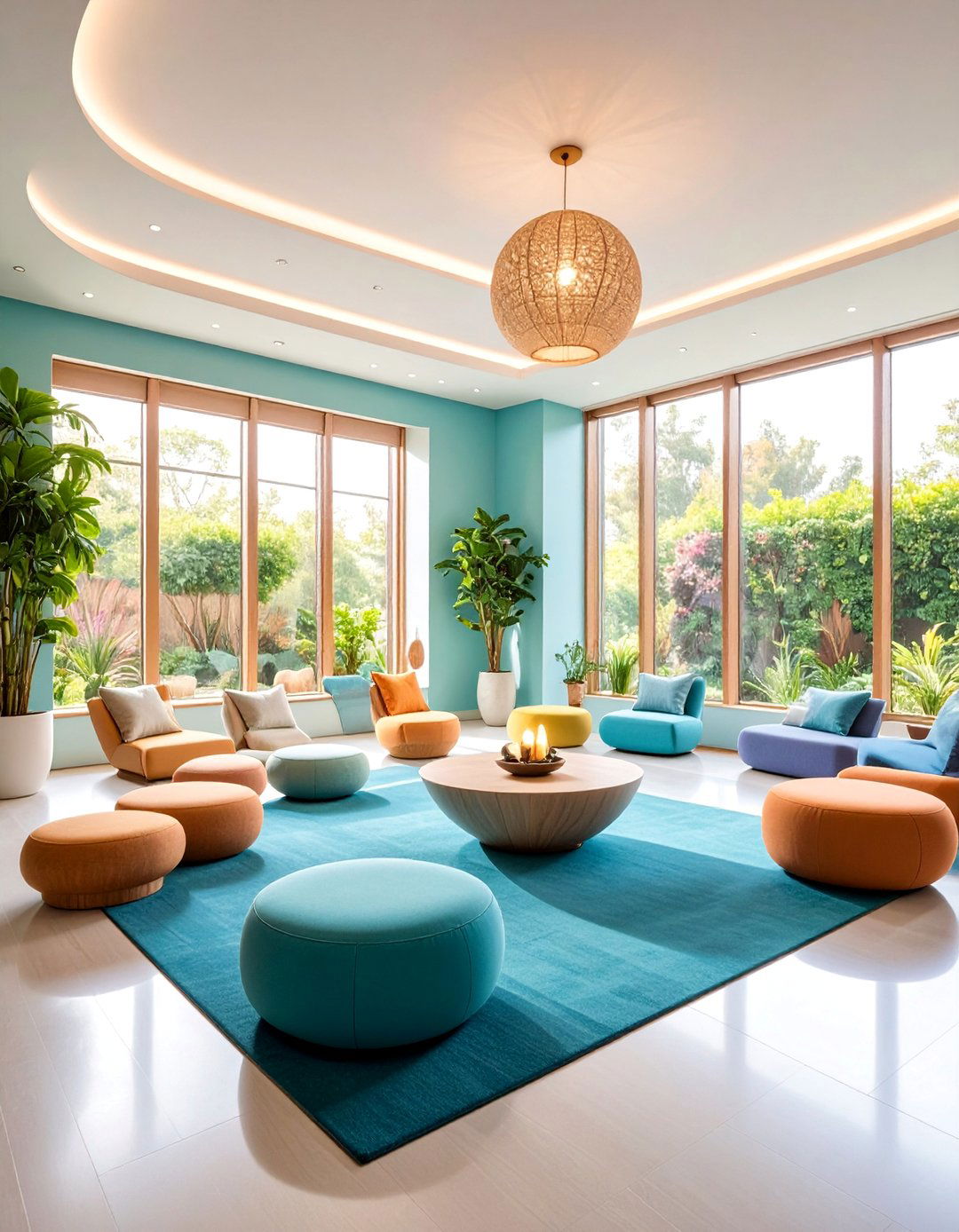
Create visual and energetic balance through symmetrical design elements that promote mental clarity and emotional regulation. Furniture placement emphasizes balance while maintaining therapeutic positioning requirements. Paired elements like matching lamps, plants, or artwork create visual harmony while avoiding rigid formality. Color palette maintains balance through equal distribution of warm and cool tones. Natural elements provide organic contrast to structured symmetry while comfortable seating ensures therapeutic effectiveness isn't compromised for aesthetic appeal. This design appeals to clients who find comfort in order and predictability while supporting therapeutic work that benefits from environmental stability and clear energetic boundaries.
23. Vintage Comfort Library Style with Timeless Warmth

Embrace timeless comfort through vintage-inspired furniture, rich colors, and library aesthetics that suggest wisdom and continuity. Comfortable leather furniture shows gentle wear that suggests safety and reliability while built-in bookshelves display meaningful titles and personal objects. Rich colors like deep green and burgundy provide warmth while brass lighting fixtures create intimate ambiance. Vintage accessories and meaningful objects add personality while maintaining professional boundaries. This design appeals to clients who find comfort in tradition and stability, creating an atmosphere that honors the long history of healing conversation while providing contemporary therapeutic effectiveness.
24. Multi-Sensory Healing Space with Engagement Options
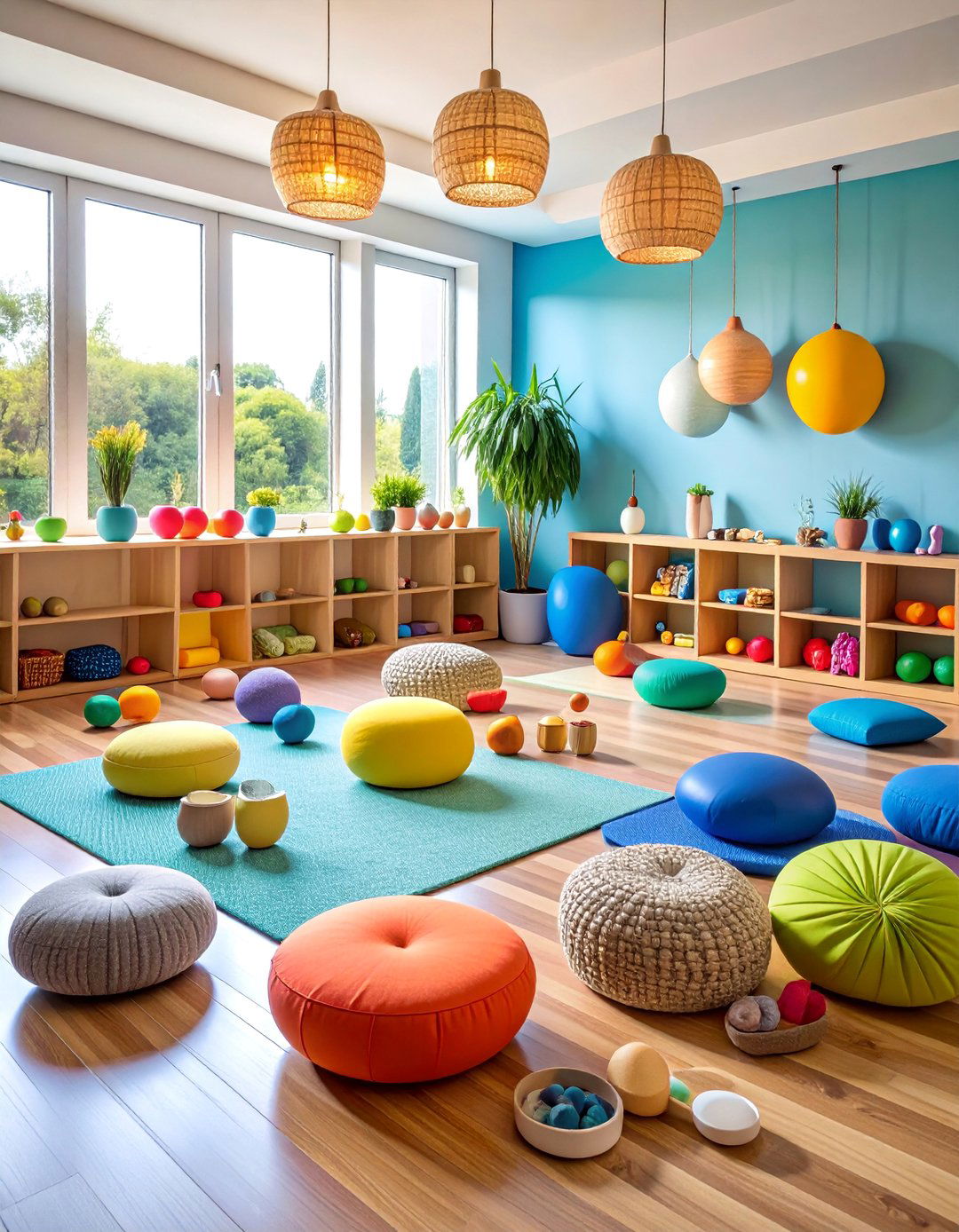
Design for multiple sensory experiences that can support various therapeutic approaches and client needs. Varied textures, gentle sounds, appropriate scents, and visual elements create rich sensory environment while maintaining focus on therapeutic relationship. Tactile objects, soft fabrics, and natural elements provide grounding options while adjustable lighting accommodates different sensory needs. Comfortable seating accommodates various sensory preferences while maintaining therapeutic positioning. Storage keeps sensory tools organized but accessible. This design particularly benefits clients with sensory processing needs, trauma histories, or therapeutic approaches incorporating body awareness while maintaining professional therapeutic boundaries and effectiveness.
25. Personal Haven Eclectic Office with Individual Expression

Create a unique therapeutic environment that reflects your personality while maintaining professional effectiveness and client comfort. Carefully curated objects, artwork, and furniture pieces tell your story while creating welcoming atmosphere for clients. Comfortable seating accommodates various client needs while personal elements provide authentic connection opportunities. Color palette reflects personal preferences while maintaining therapeutic calm. Natural elements and plants provide freshness while meaningful objects spark appropriate therapeutic conversations. This design honors the importance of therapist authenticity in building therapeutic relationships while maintaining clear professional boundaries and creating safe space for client work.
Conclusion:
Designing an effective therapist office requires balancing personal expression with professional responsibility, creating spaces that feel both welcoming and therapeutically appropriate. The most successful therapy offices combine evidence-based design principles with authentic personal touches, resulting in environments that support both therapist wellbeing and client healing. Whether you choose minimalist serenity, bohemian warmth, or nature-inspired tranquility, the key lies in intentional design choices that reflect your therapeutic approach while prioritizing client comfort and safety. Remember that your office serves as the container for transformative work—invest in creating a space that honors this sacred responsibility while nurturing your own professional satisfaction and creative expression.


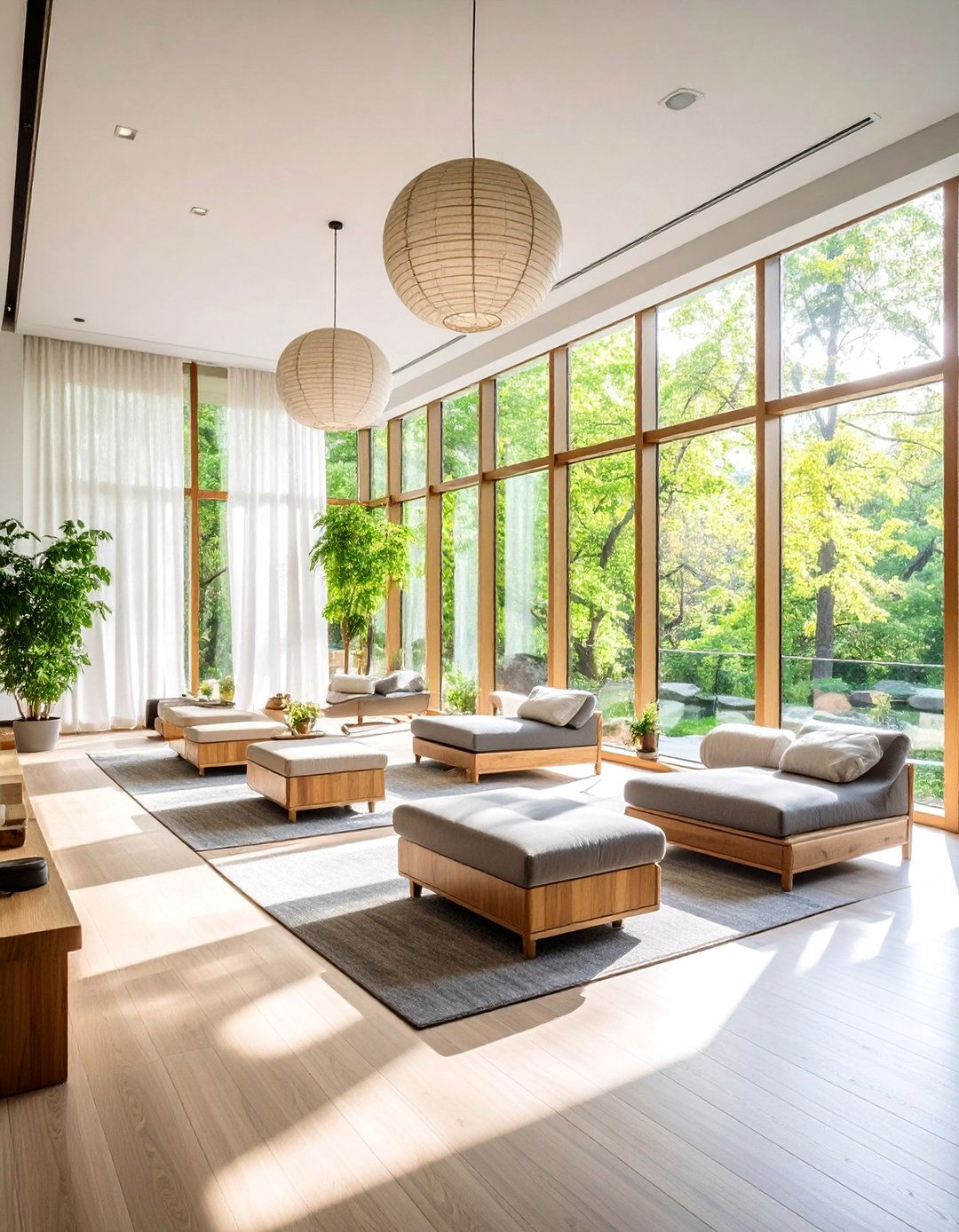
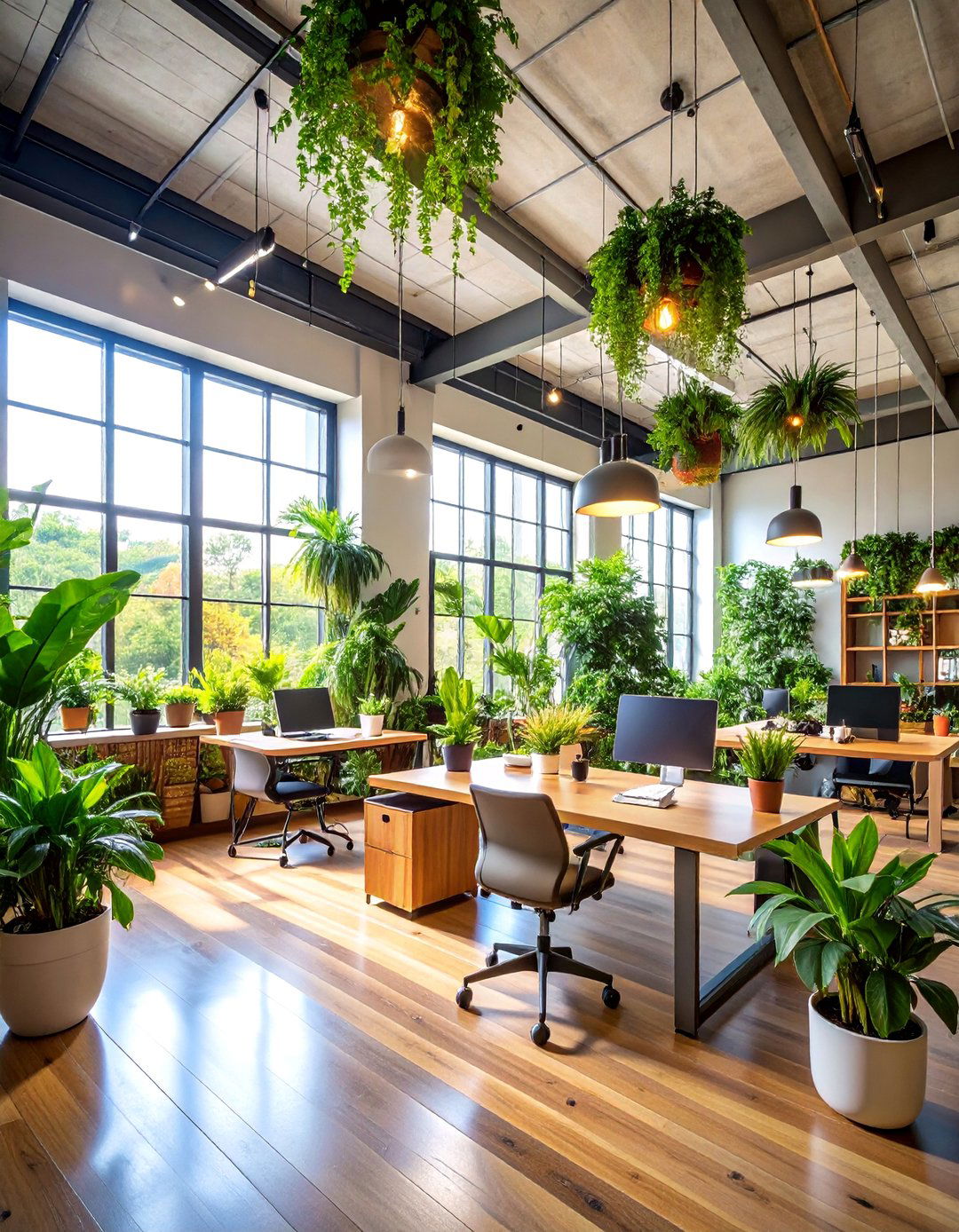
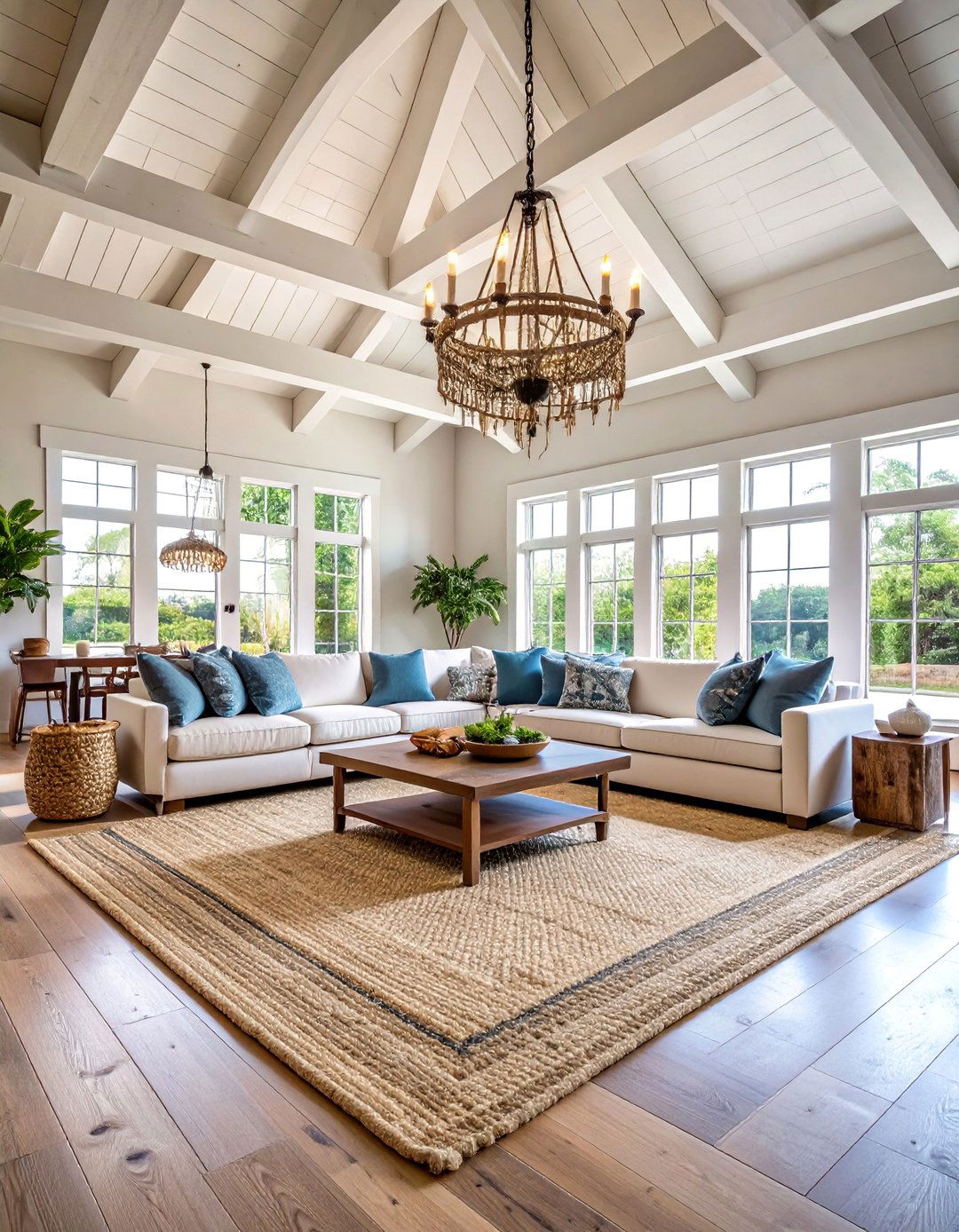

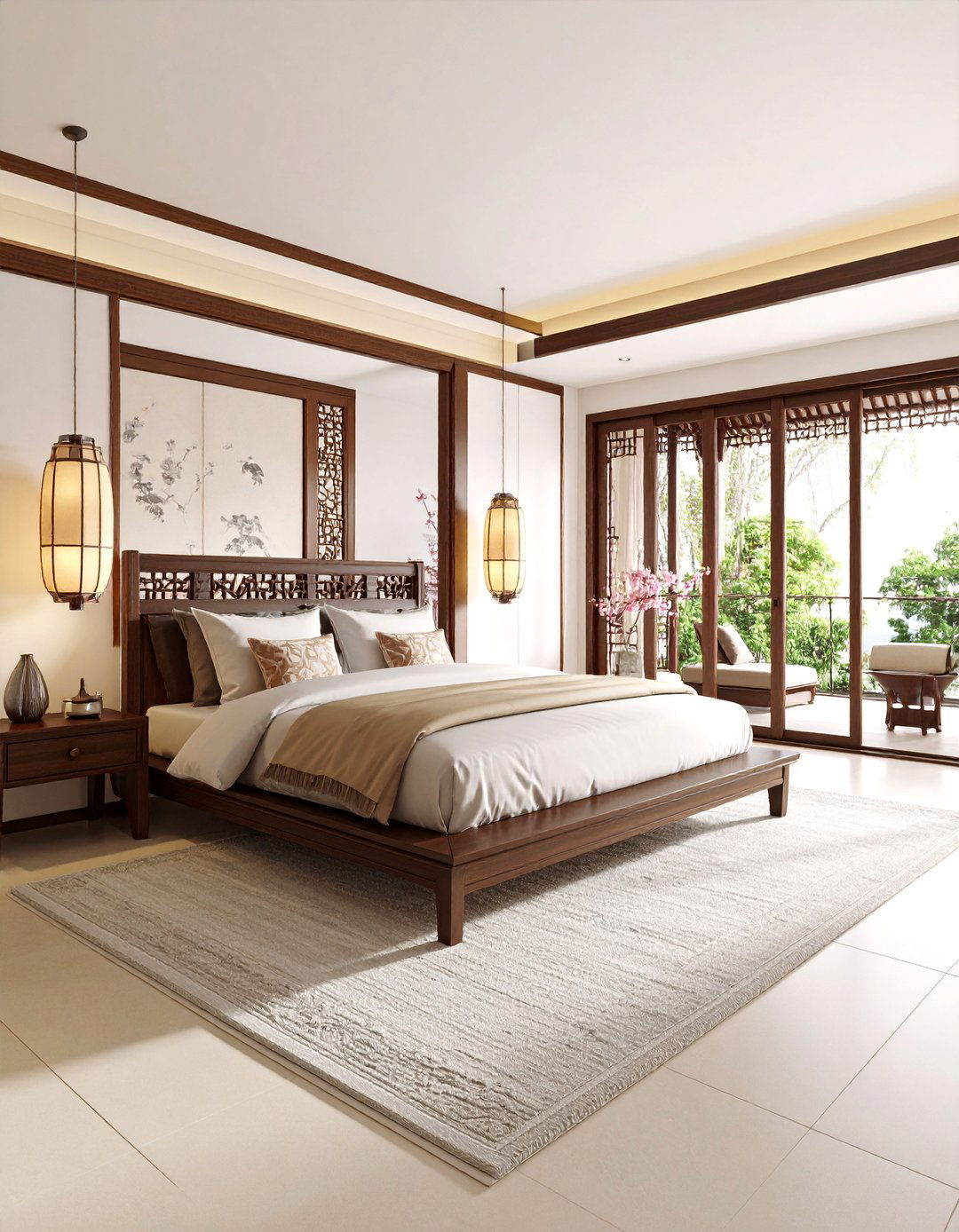

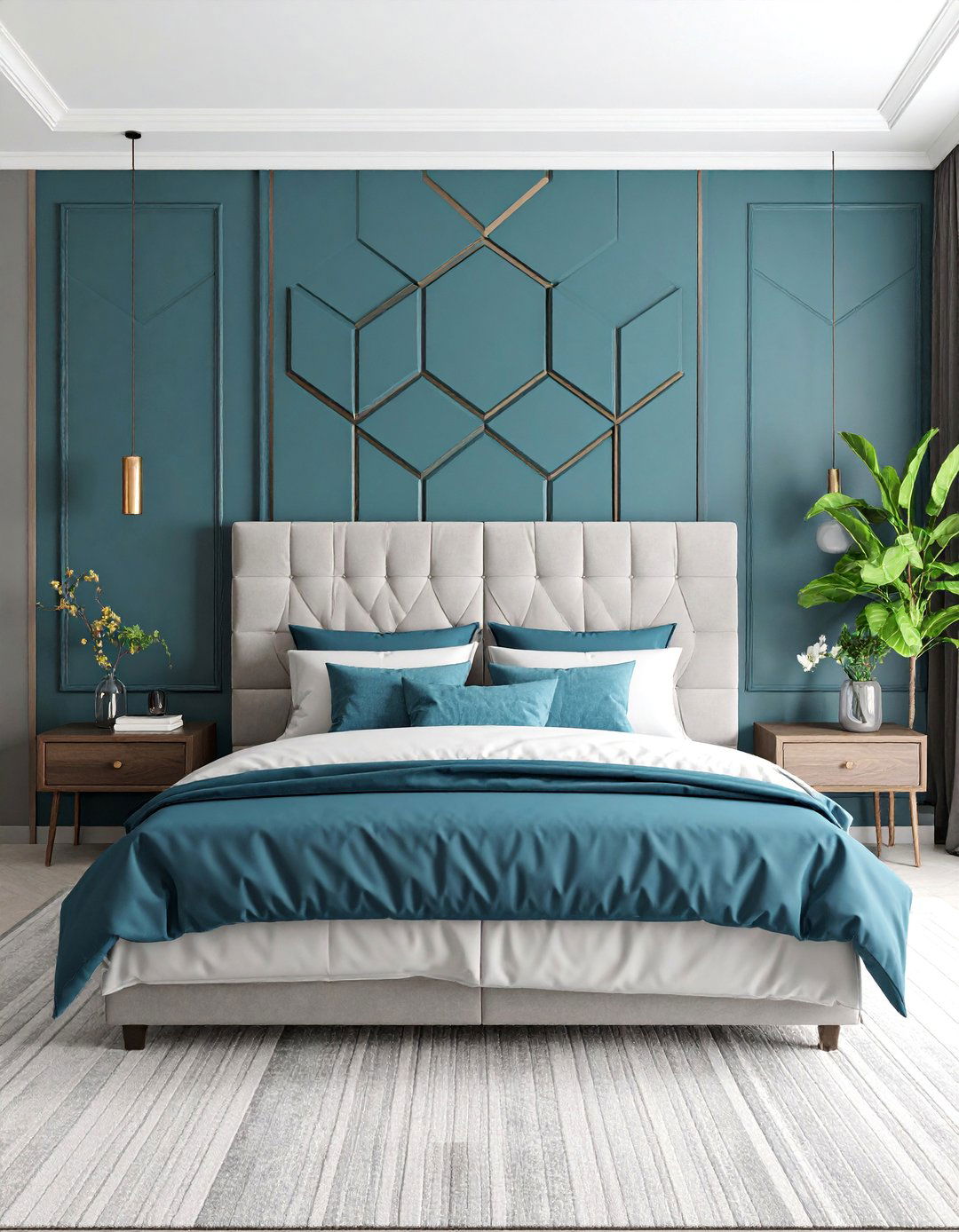
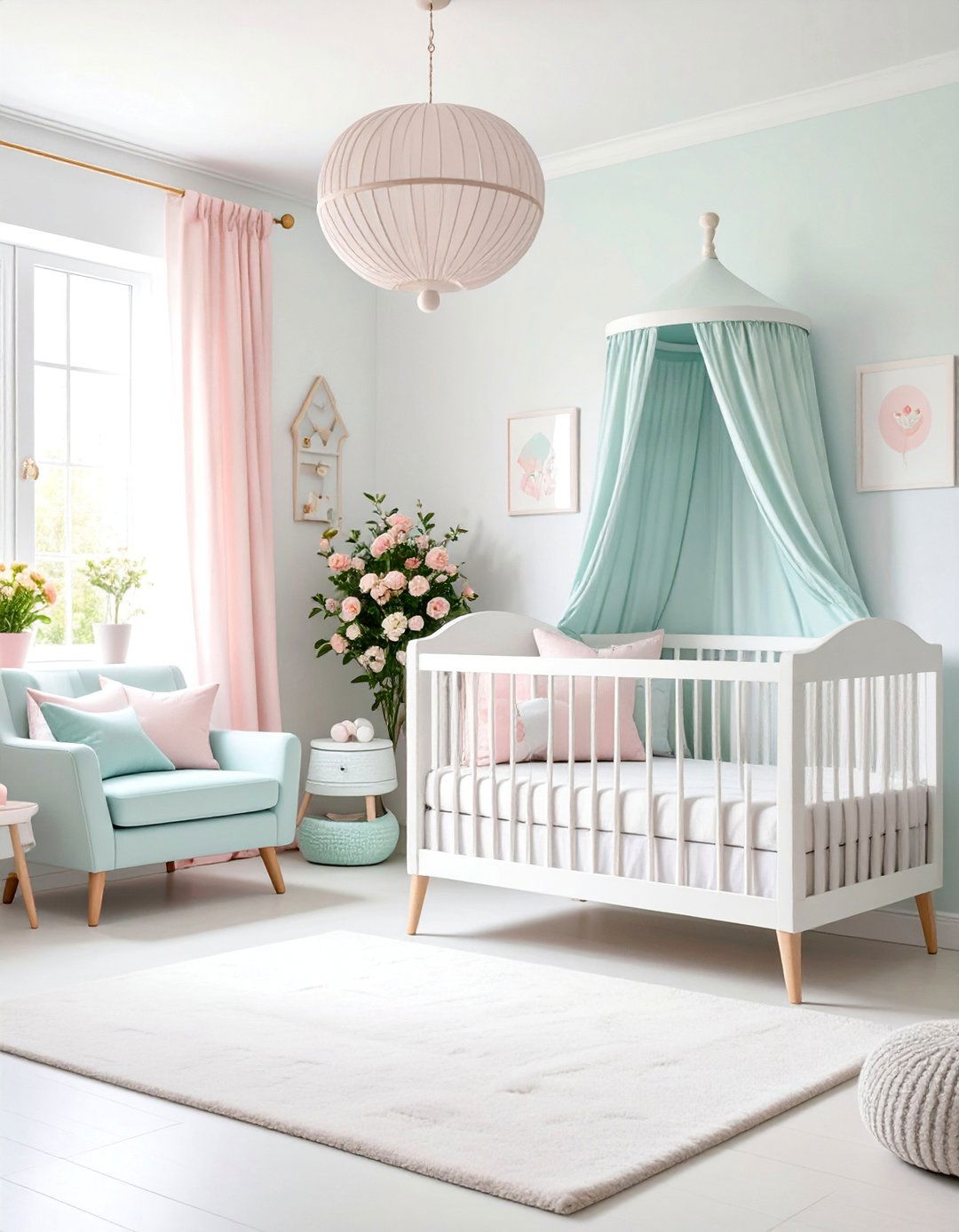
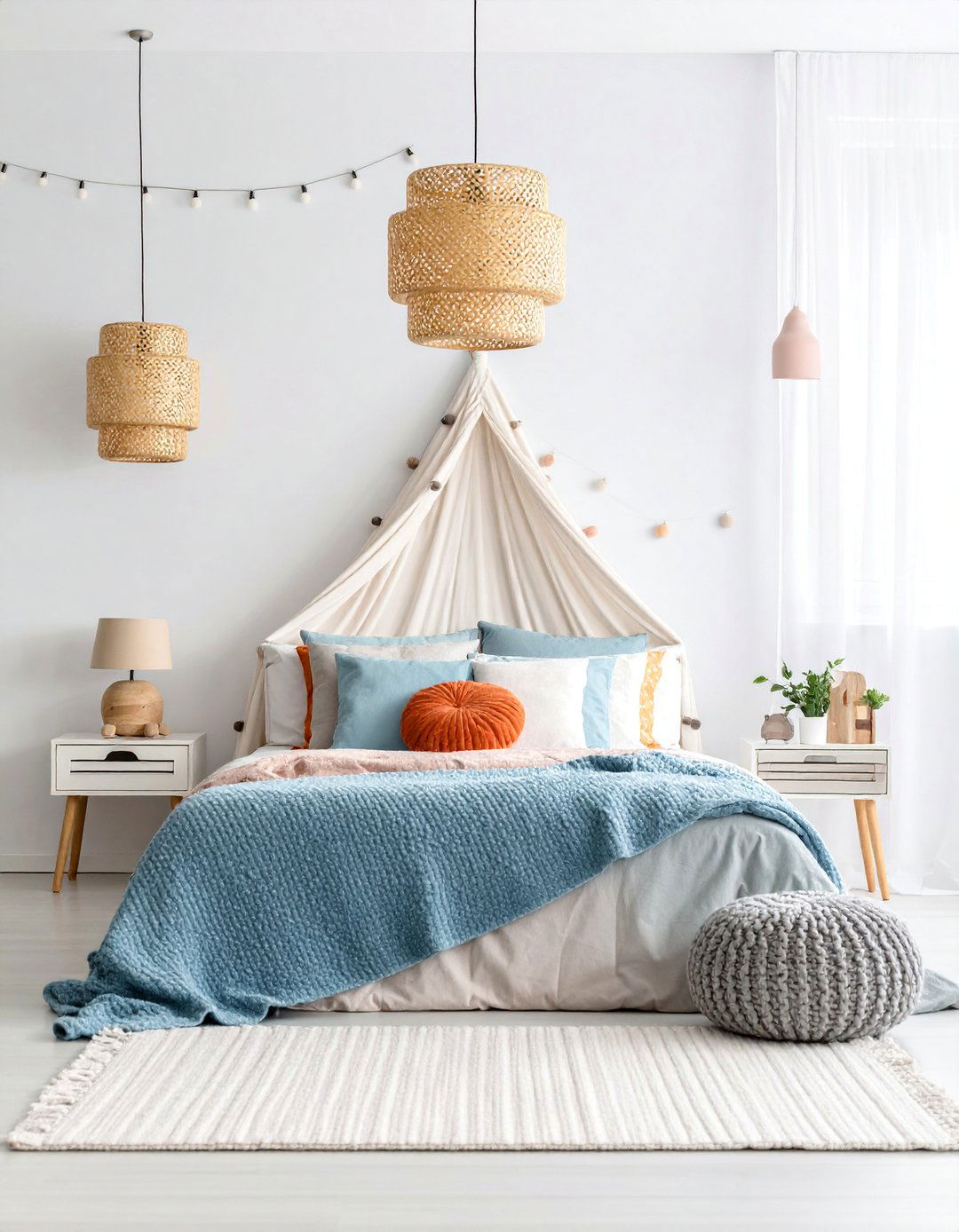
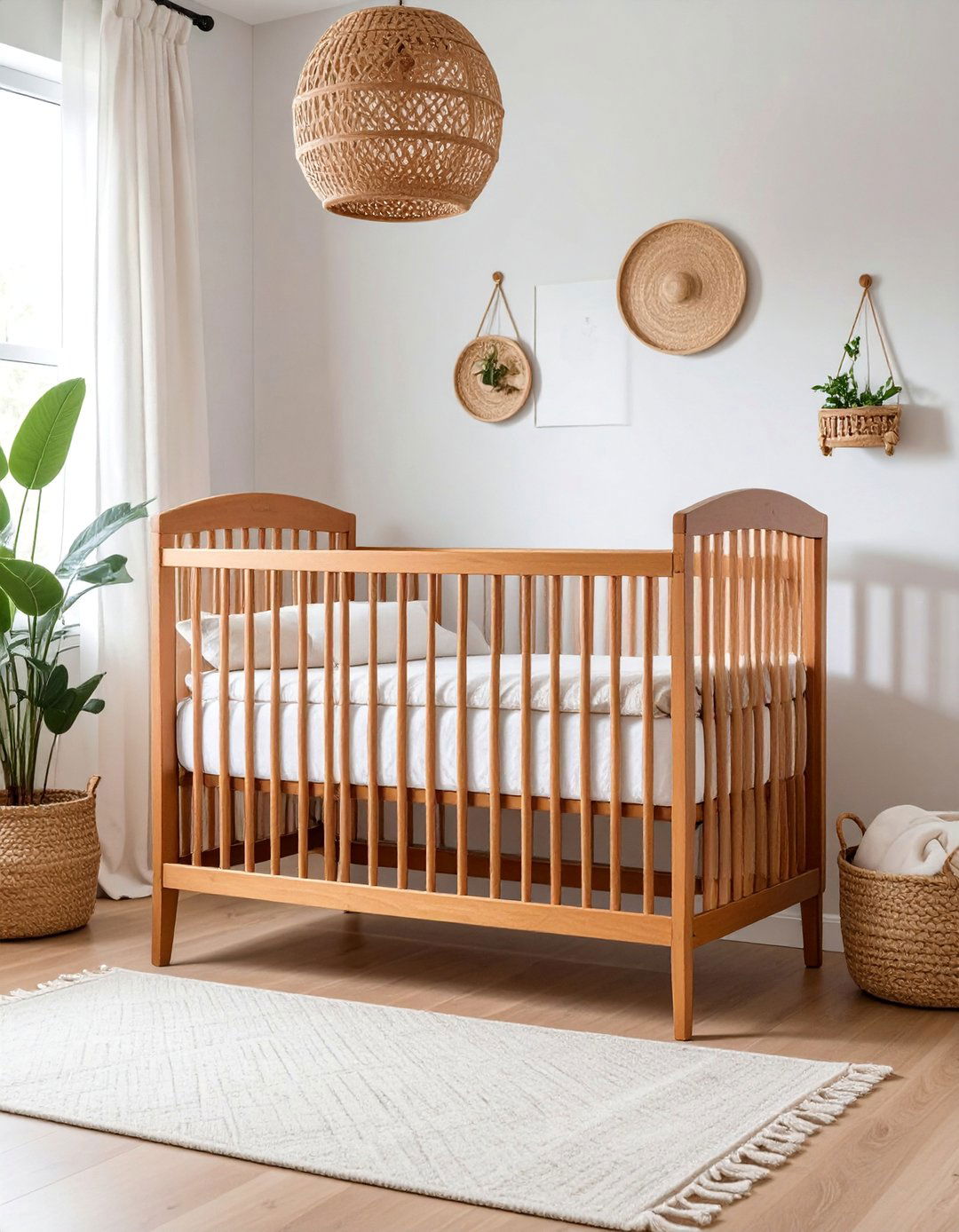
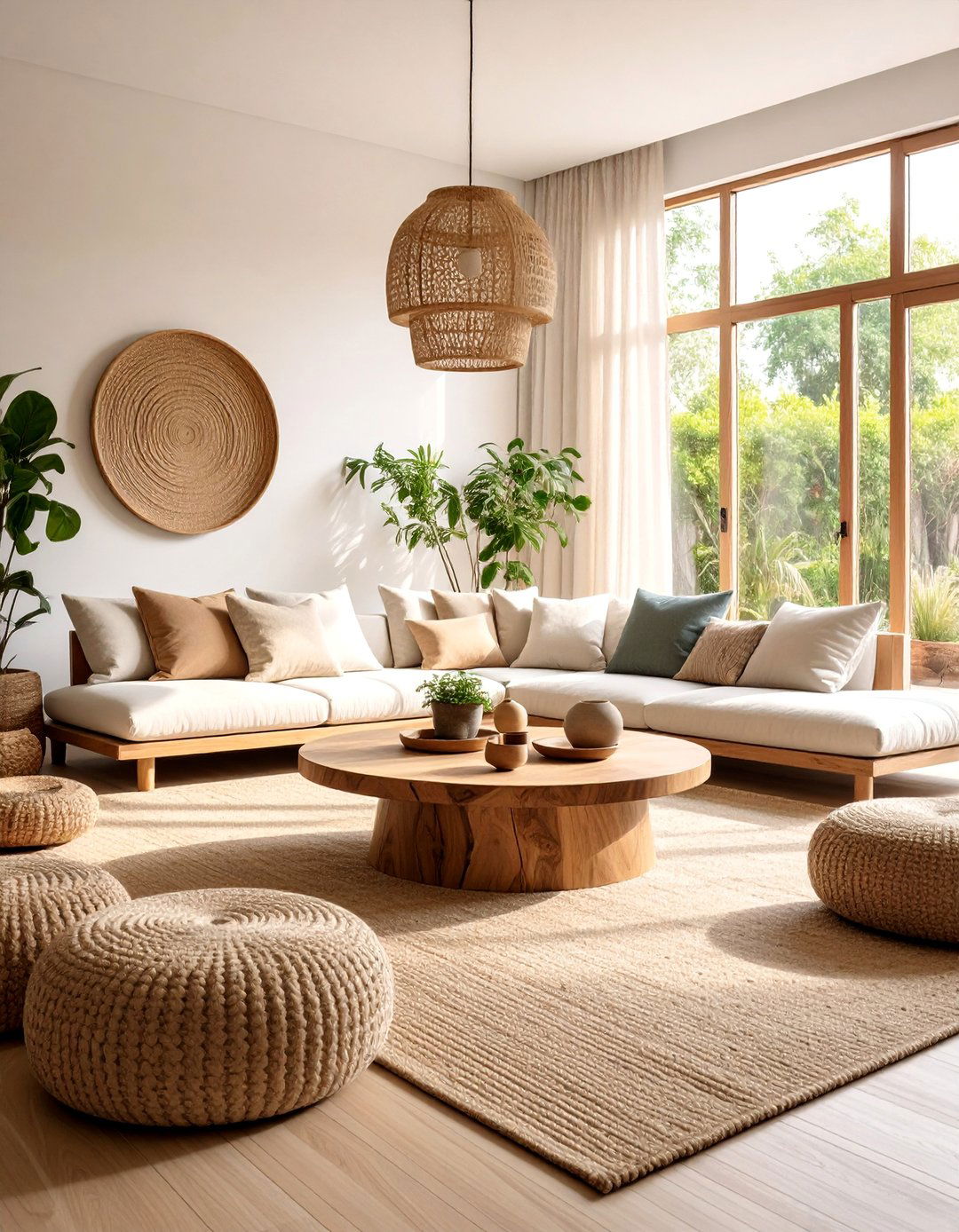
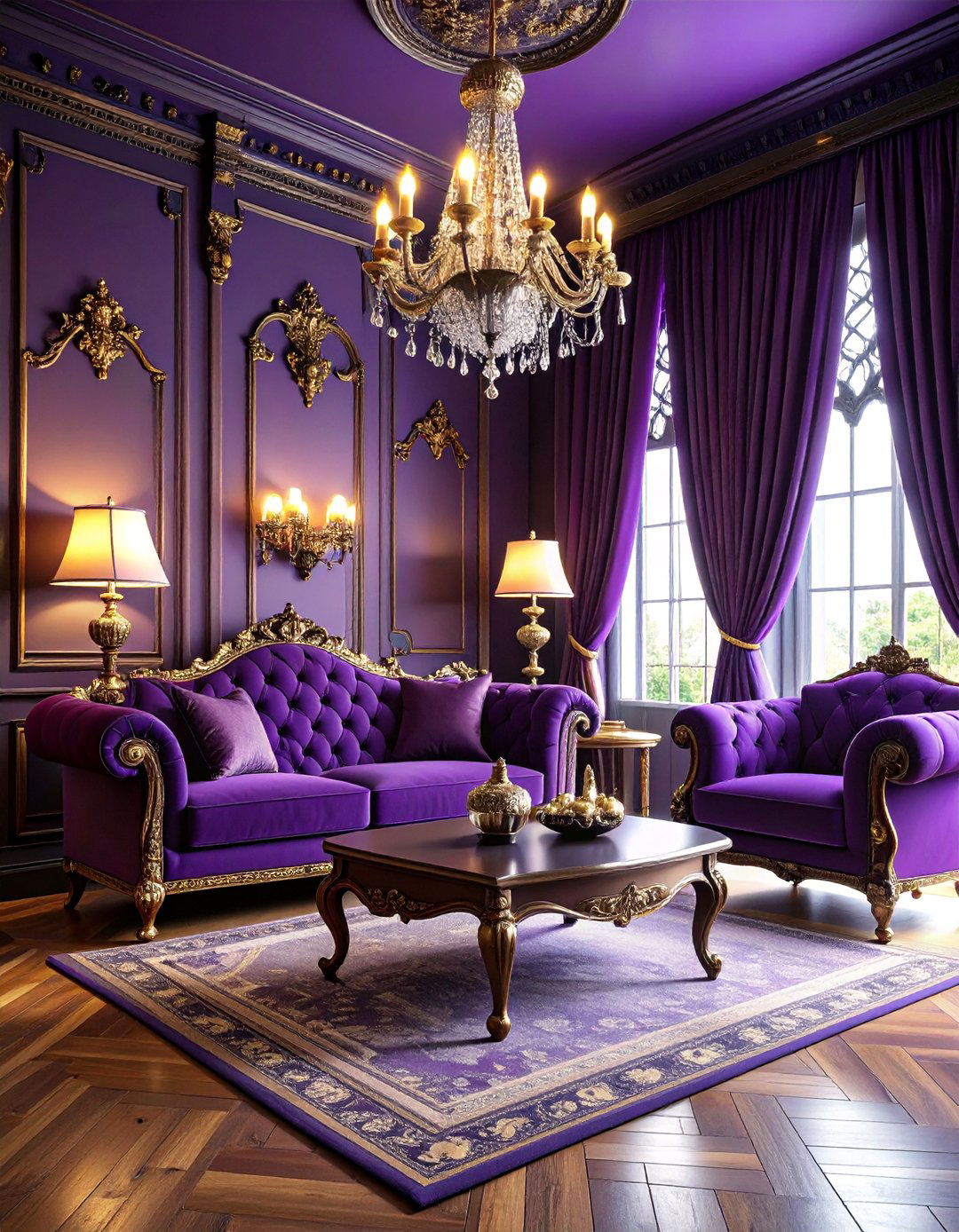
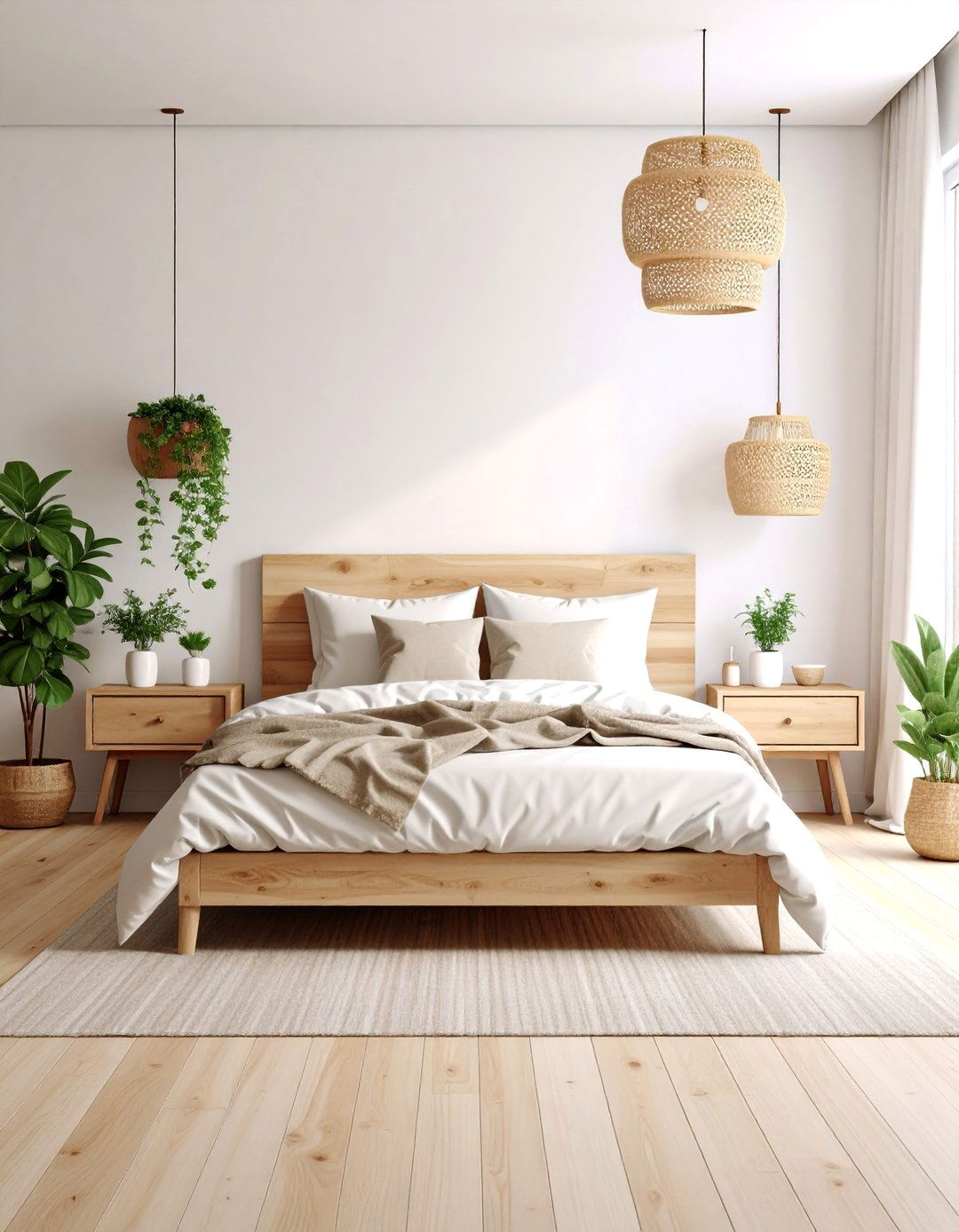
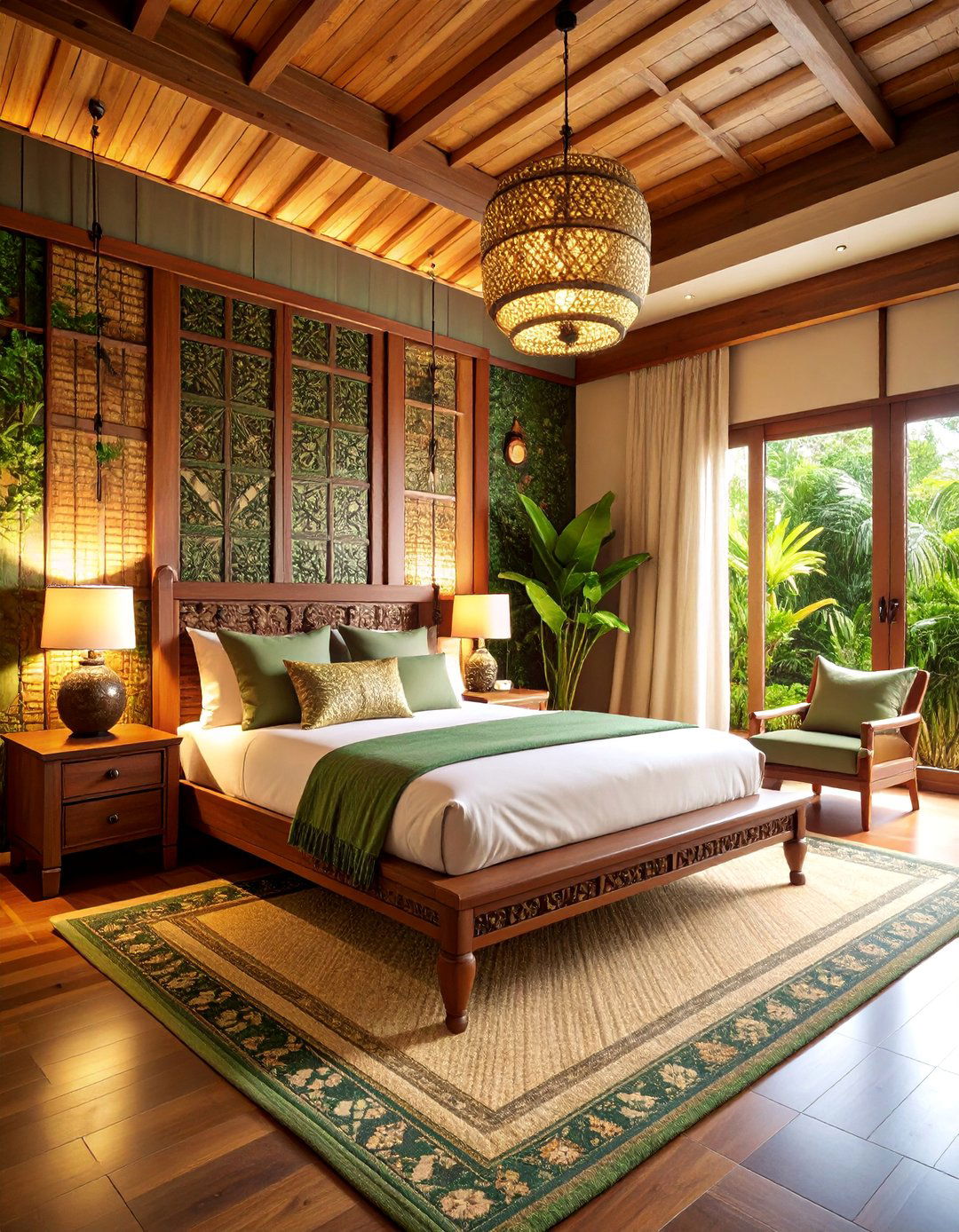
Leave a Reply